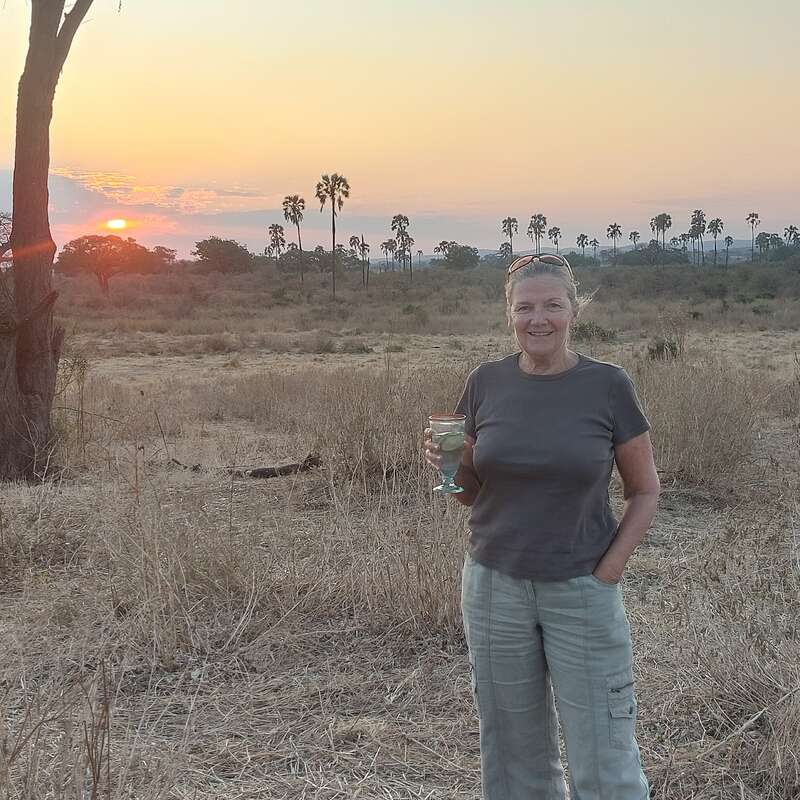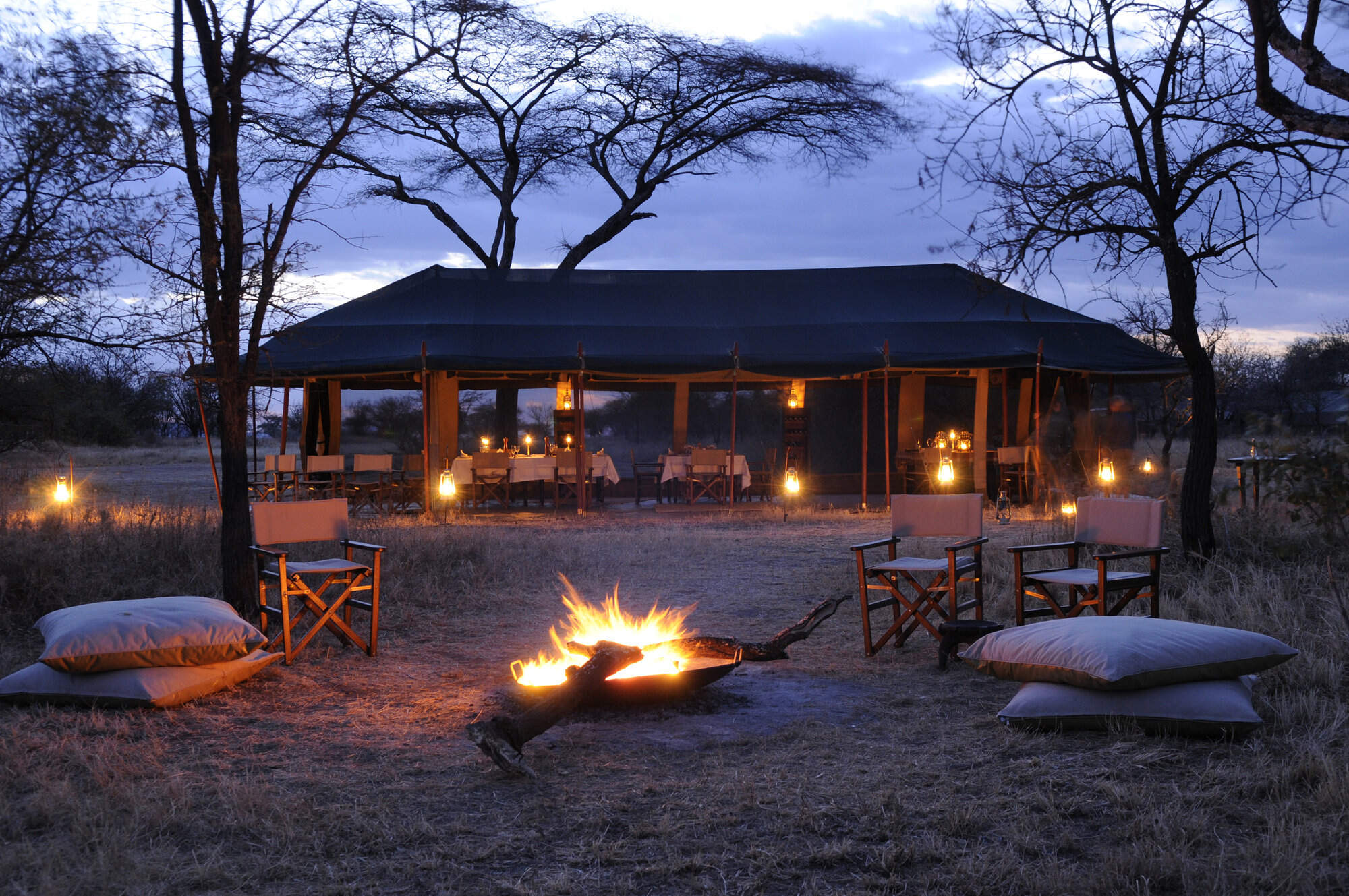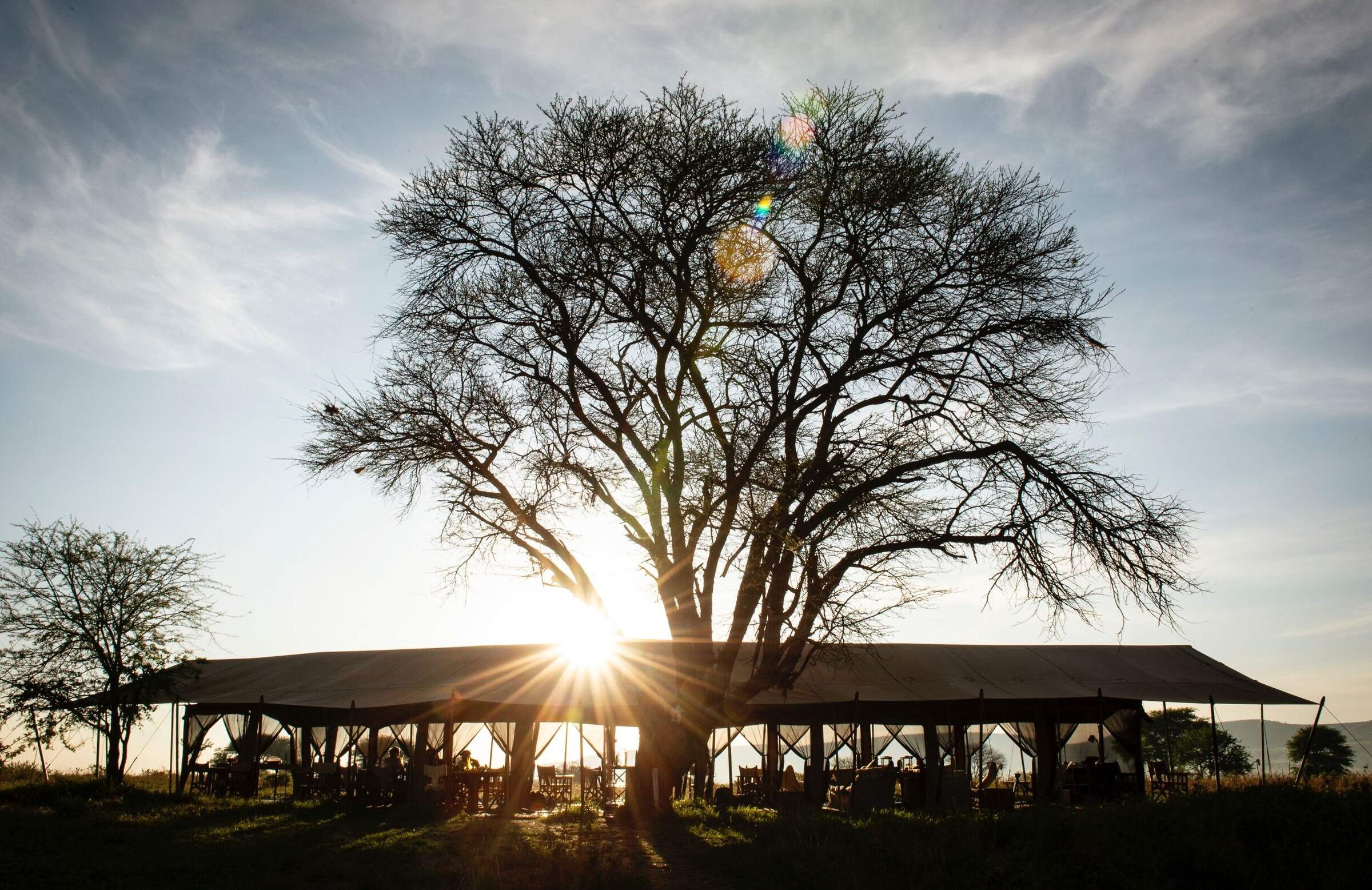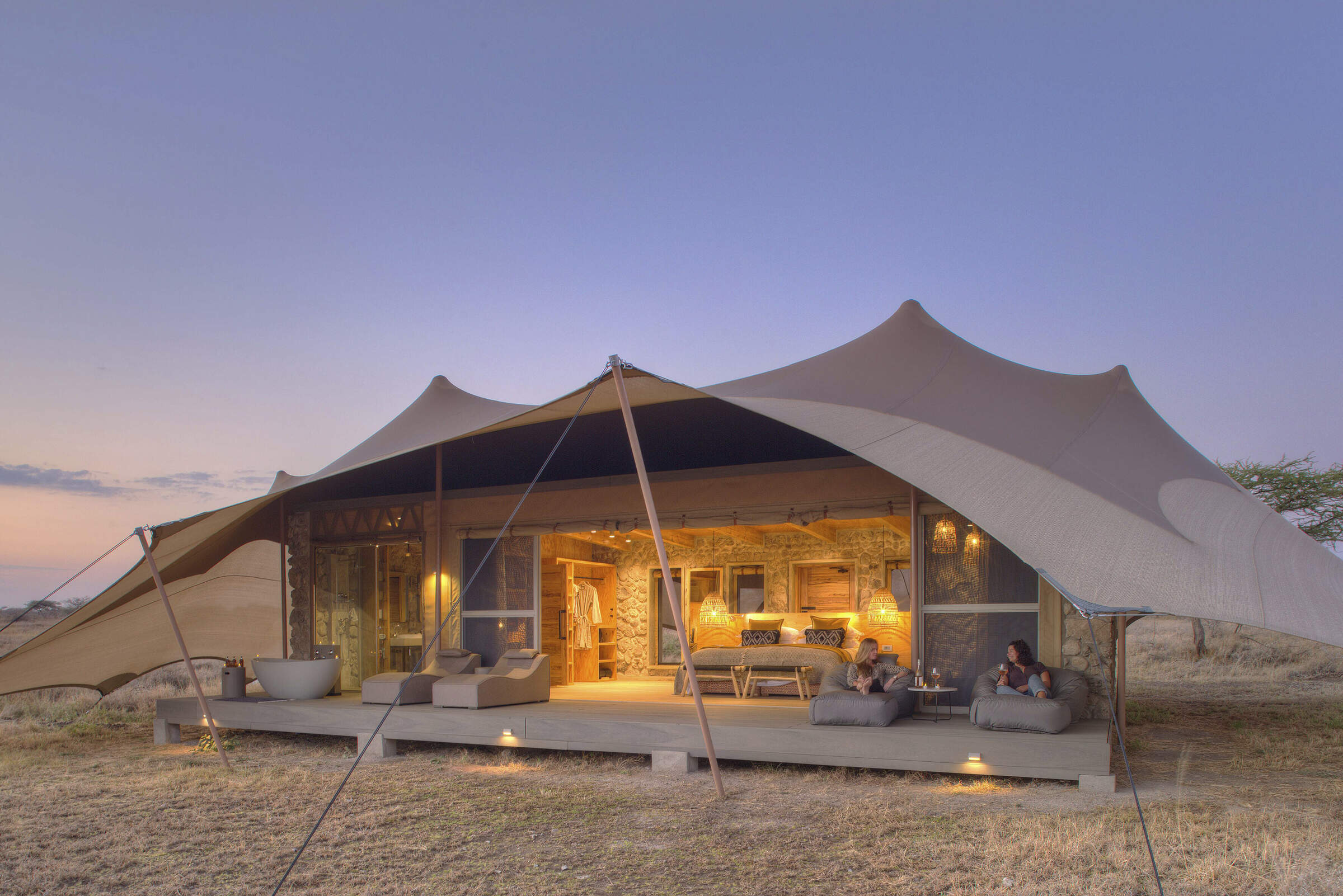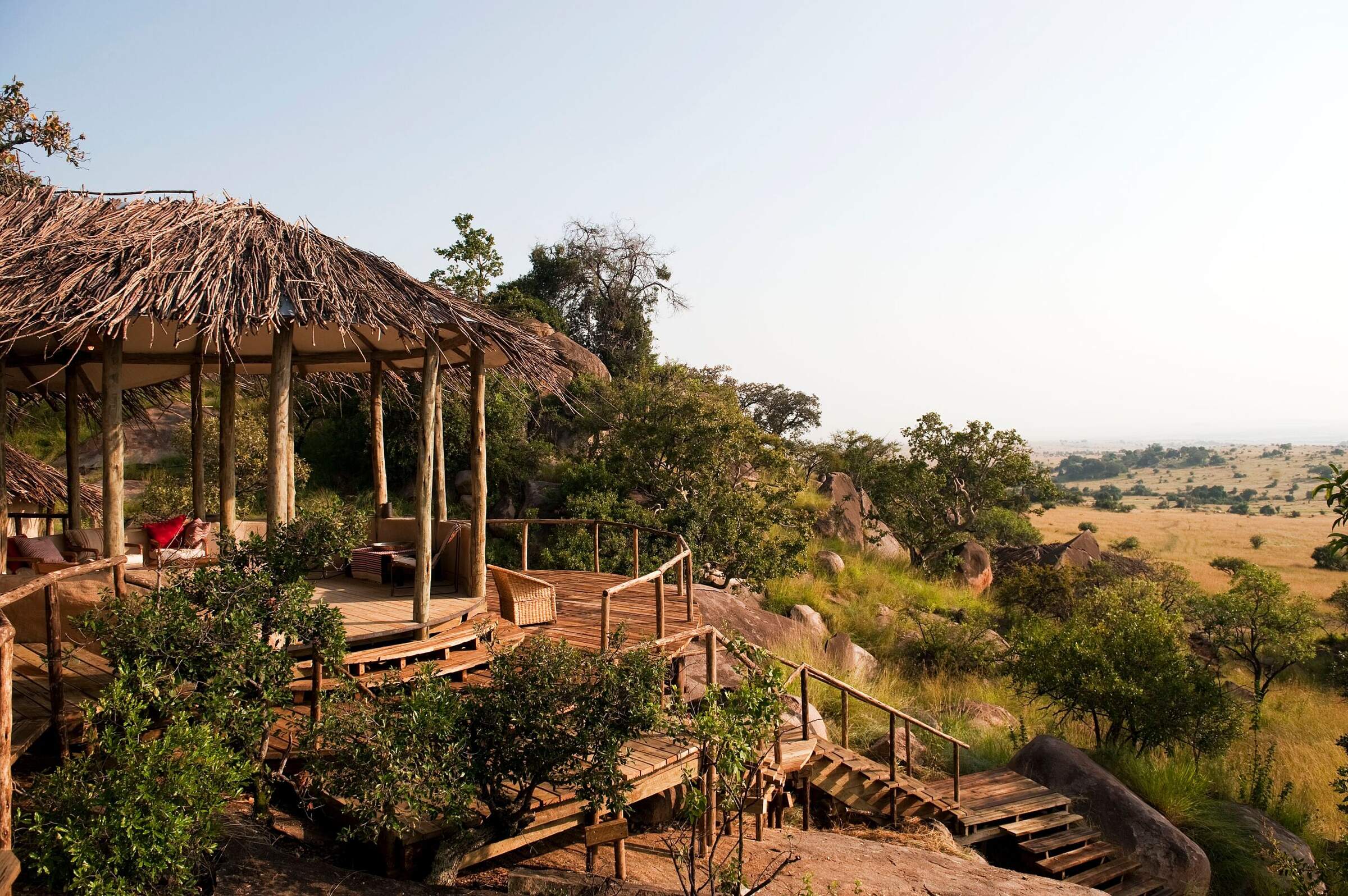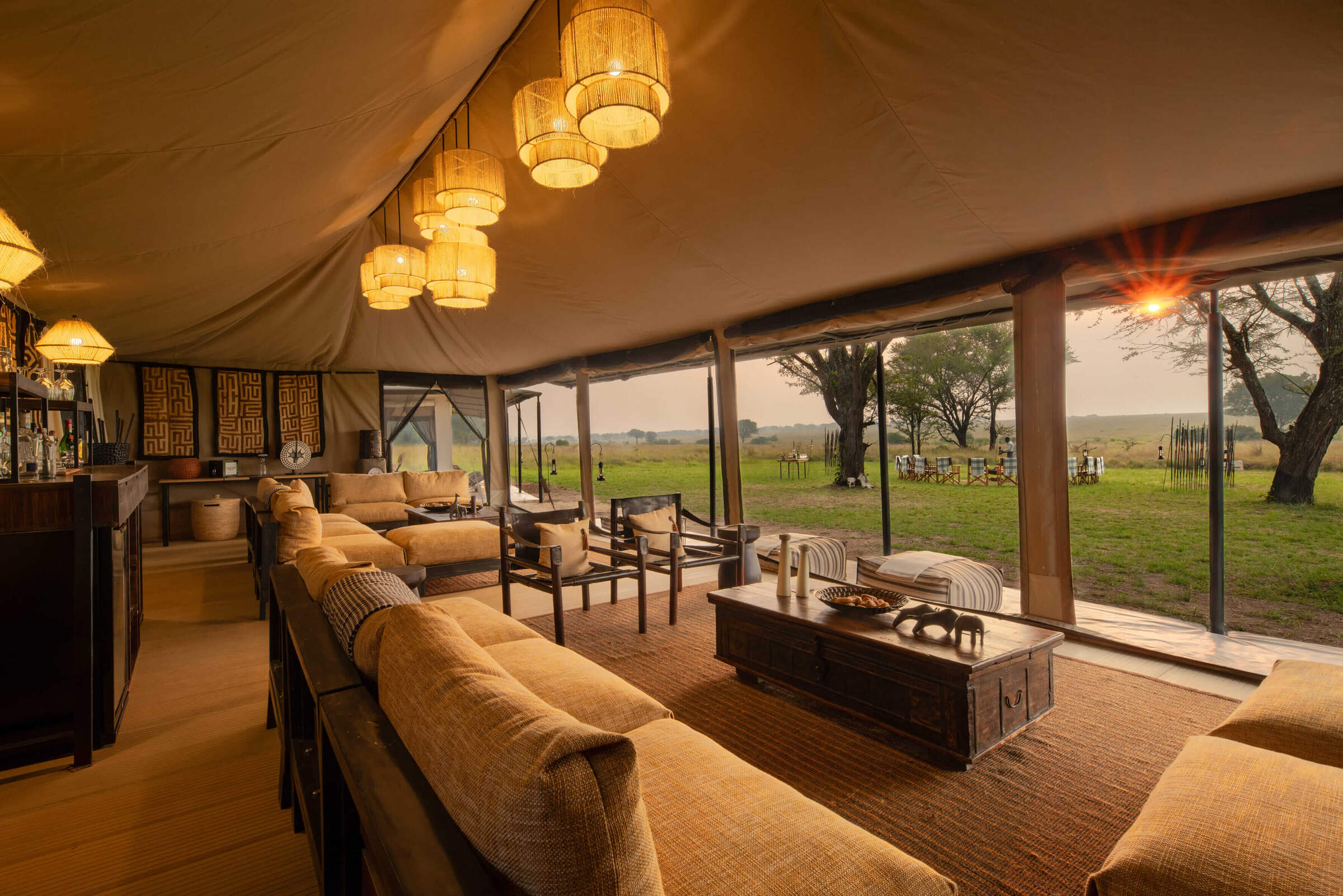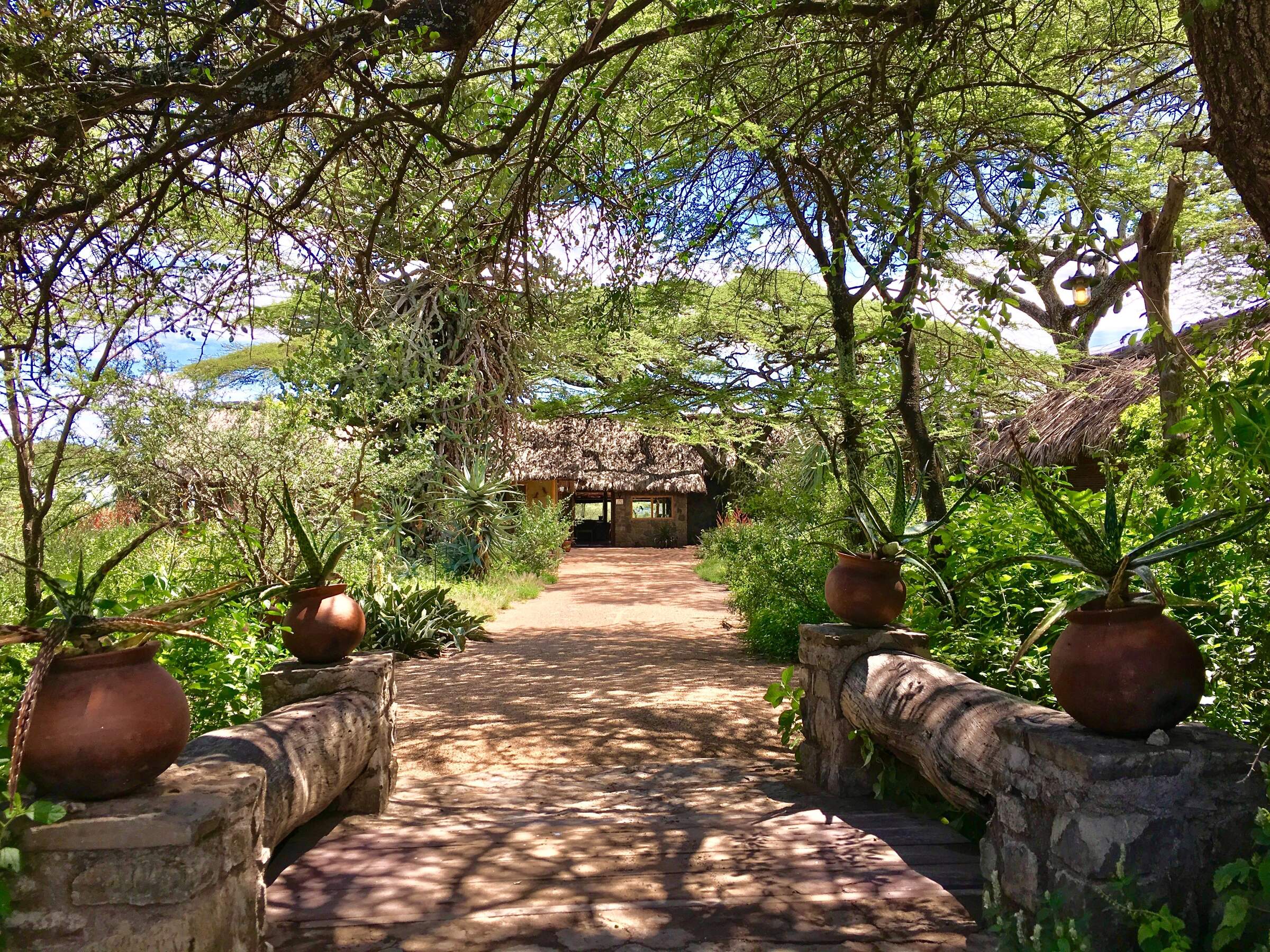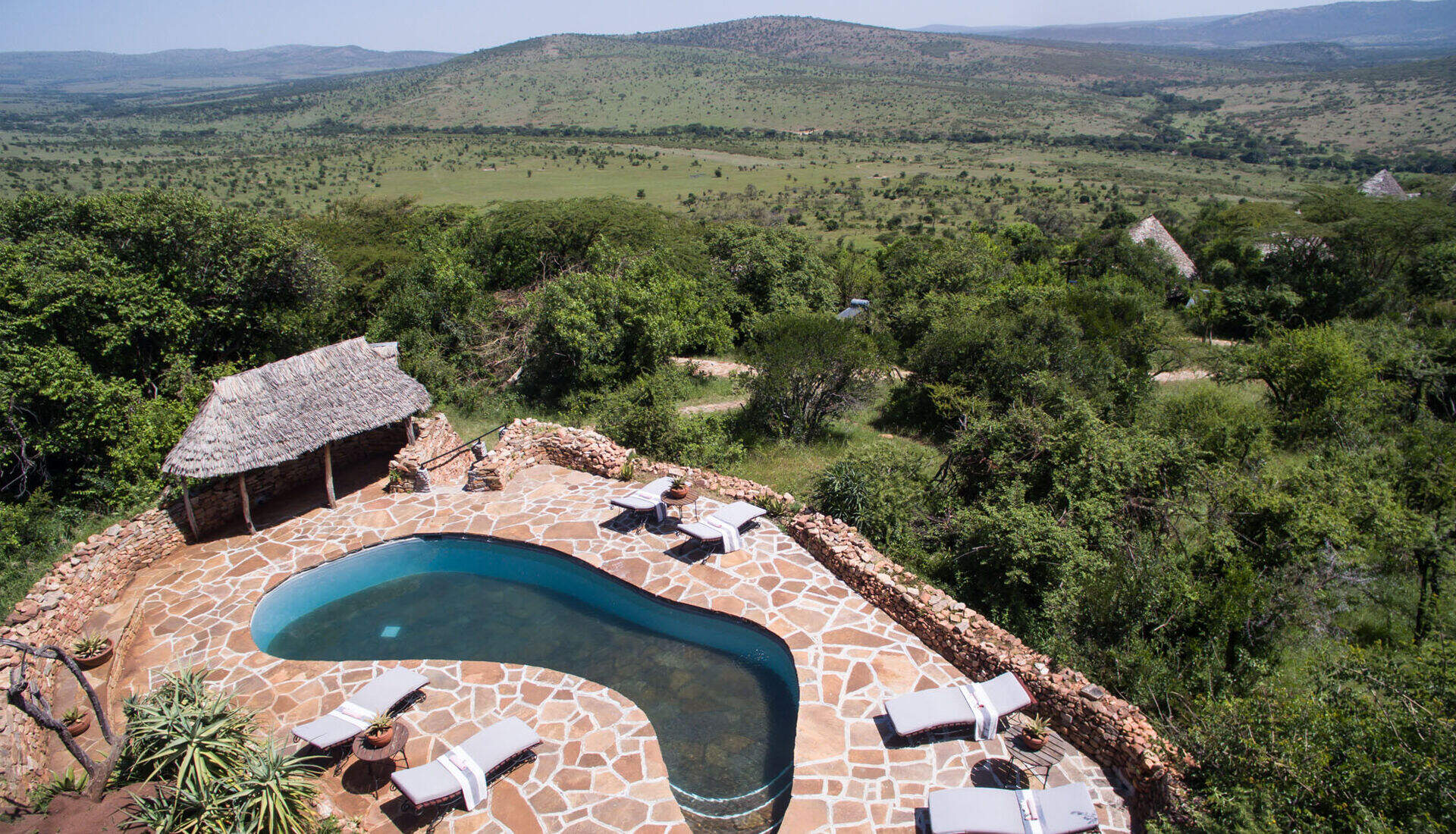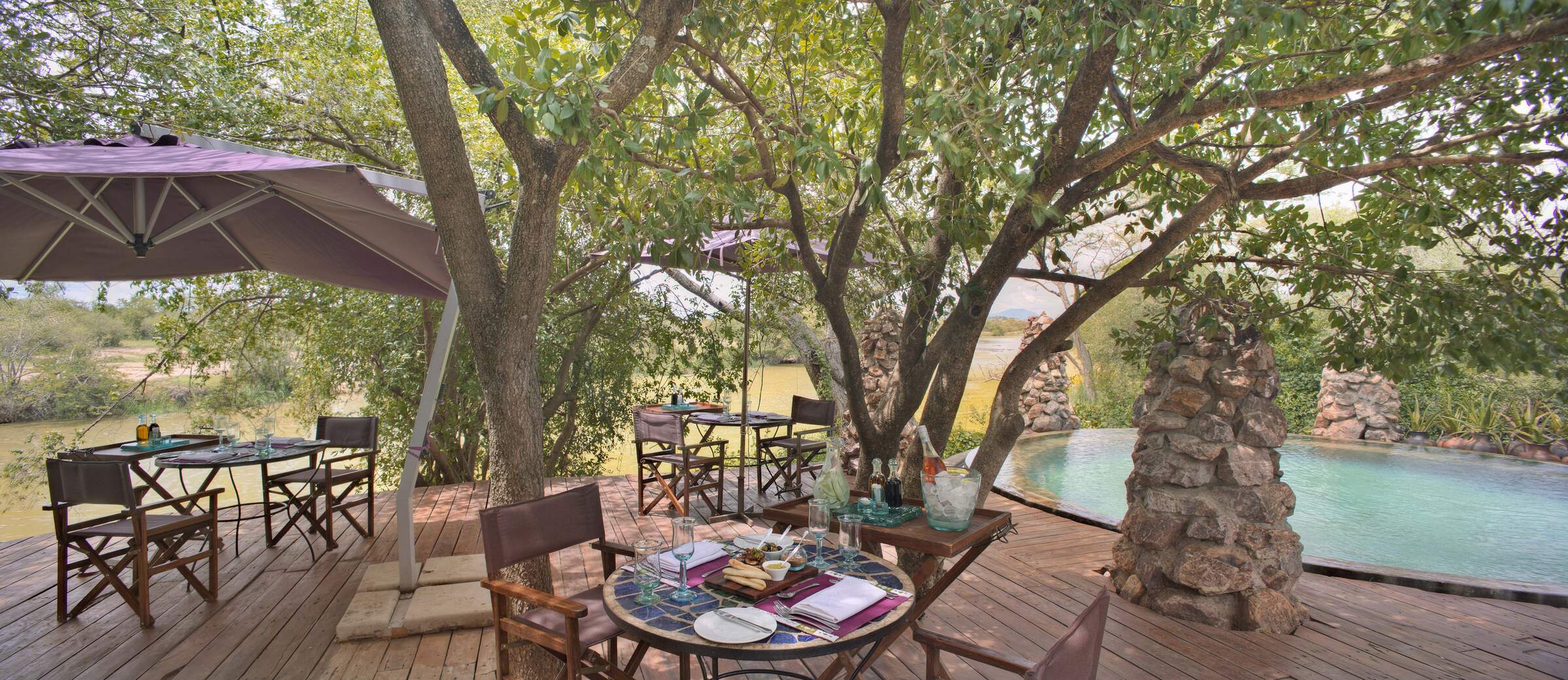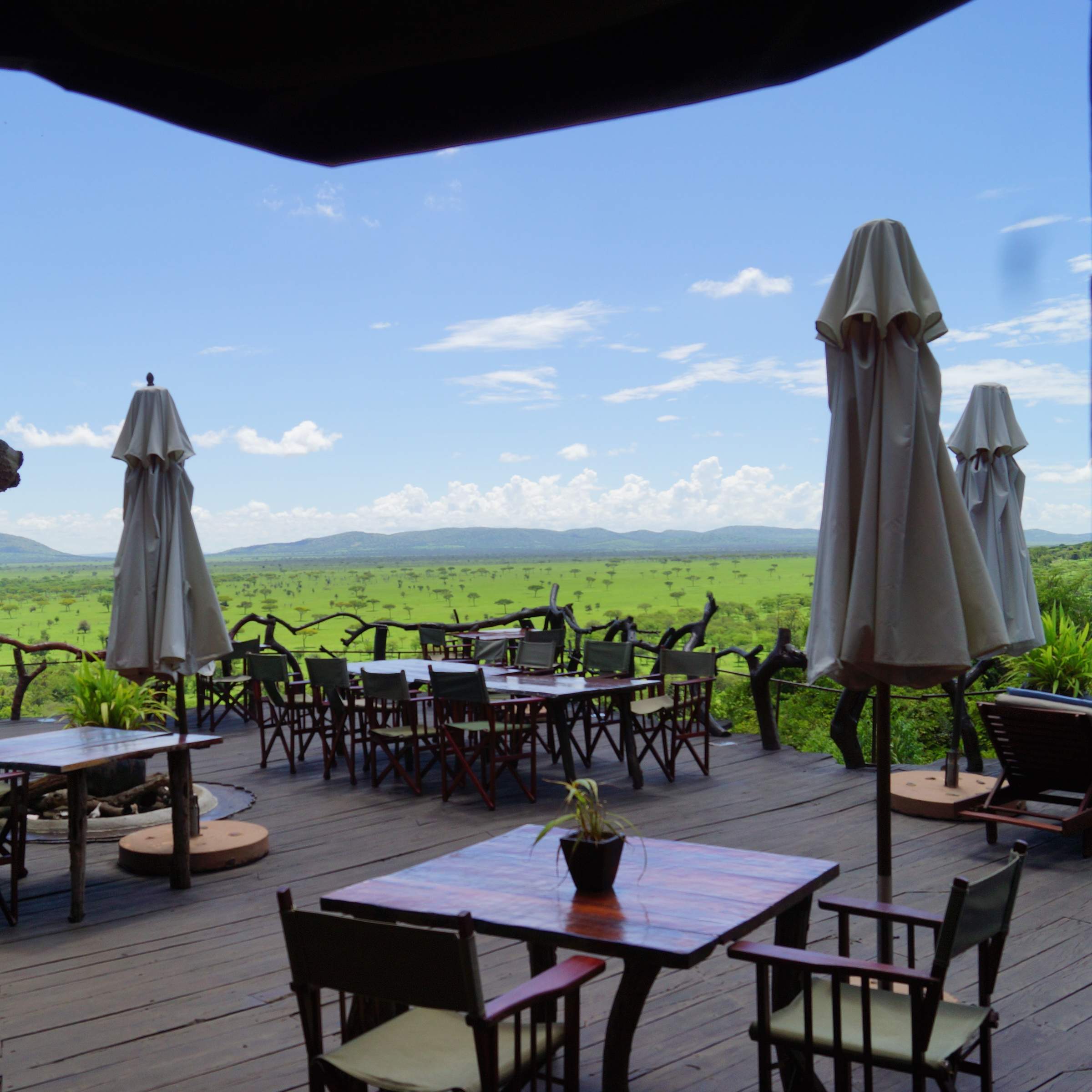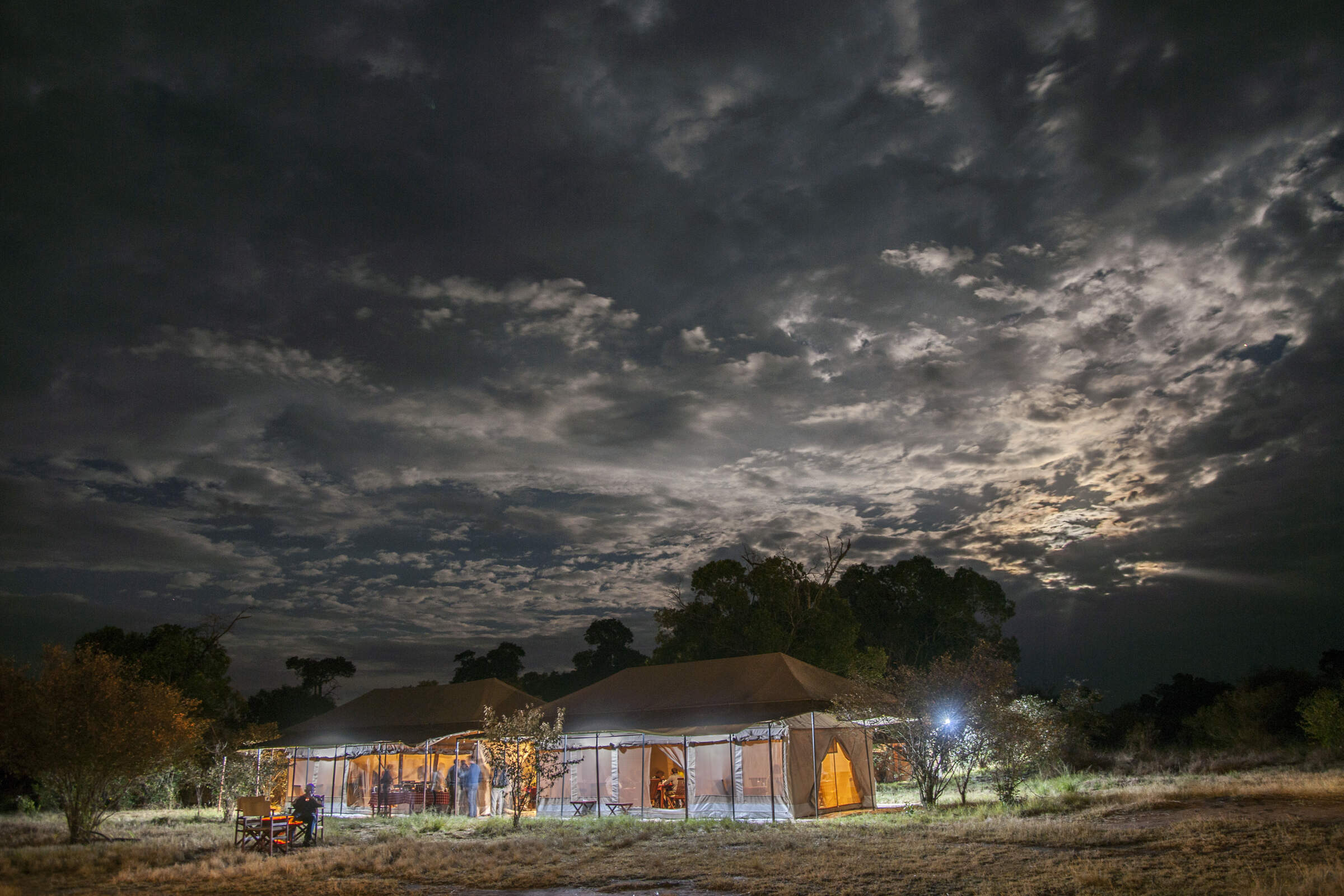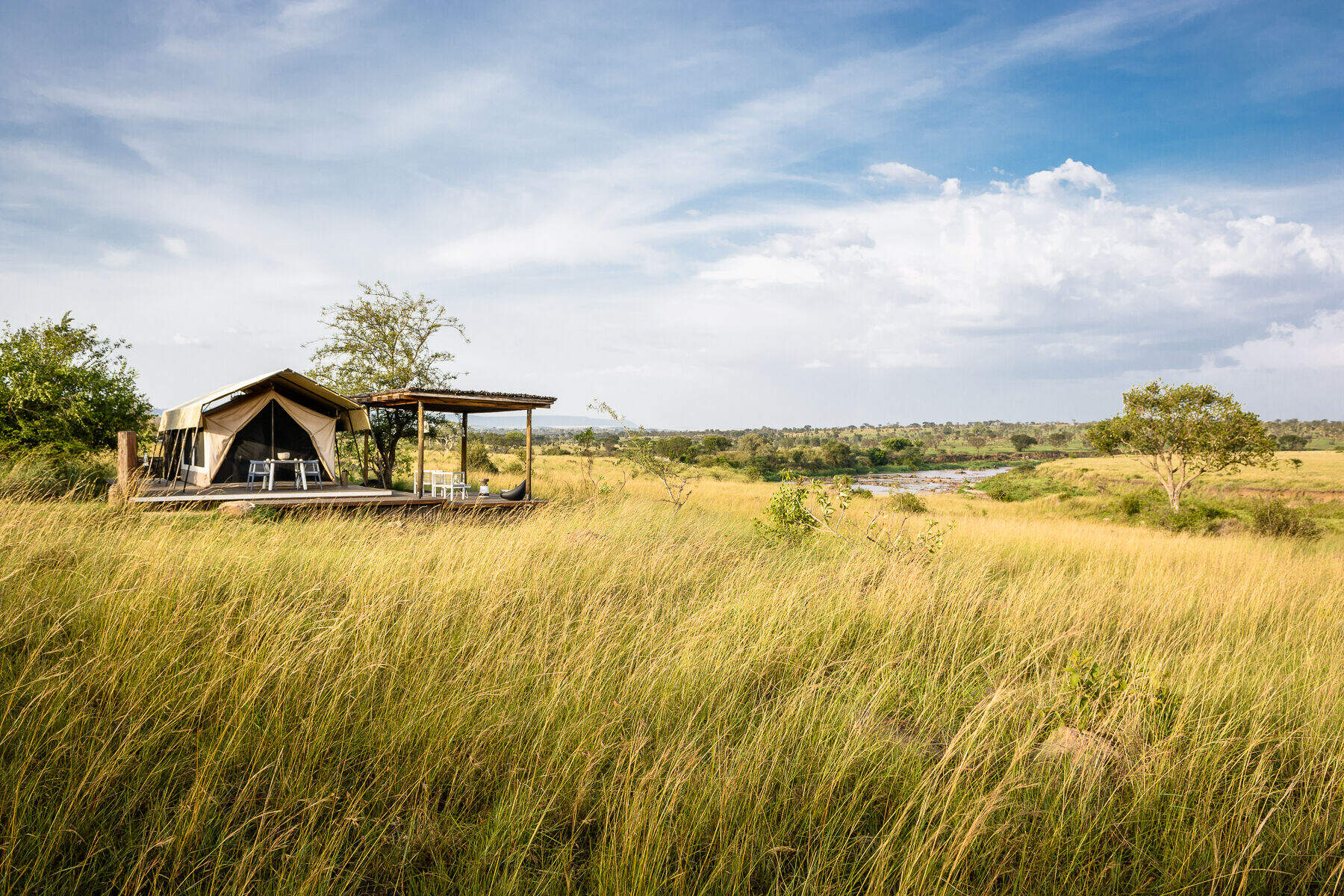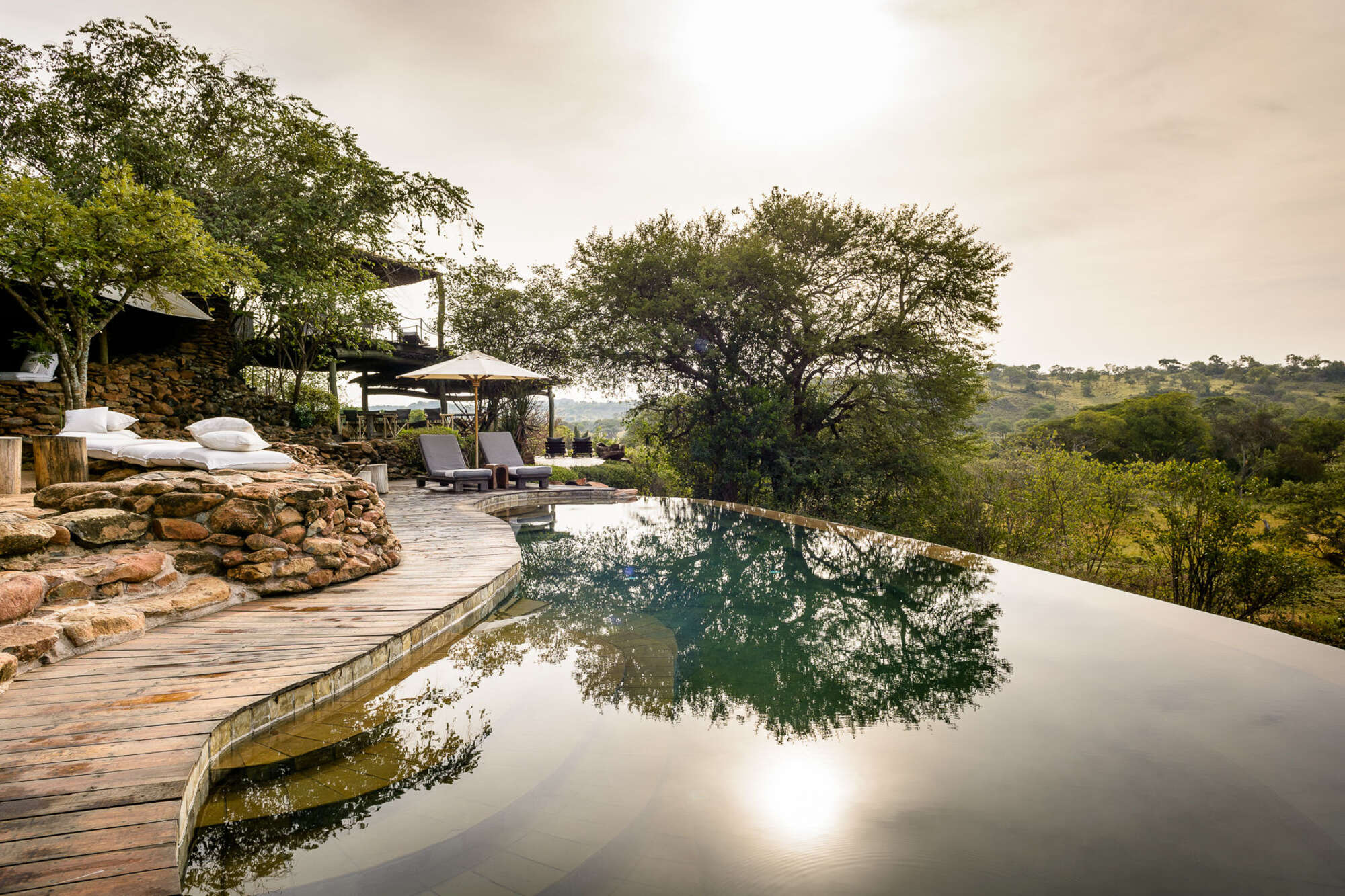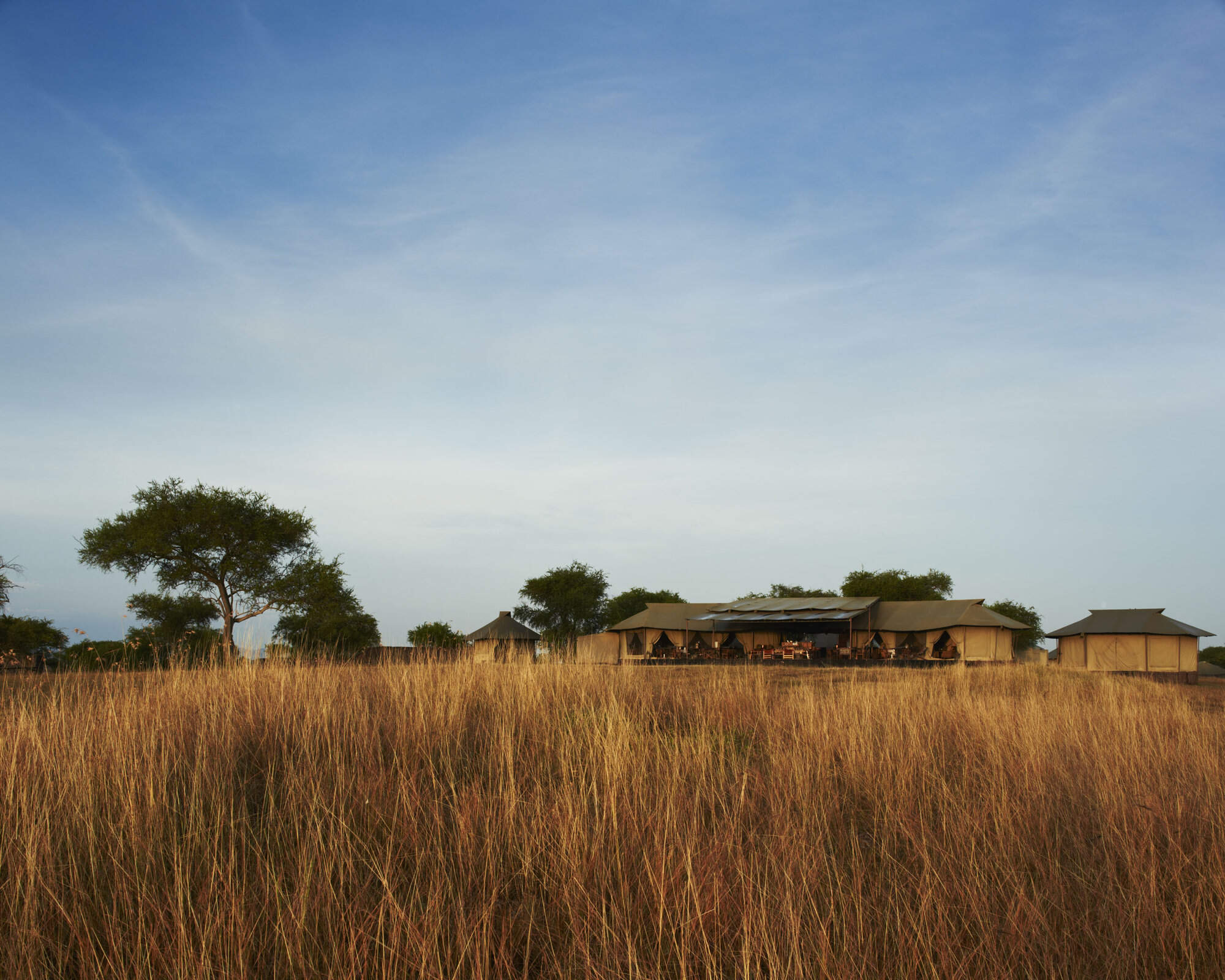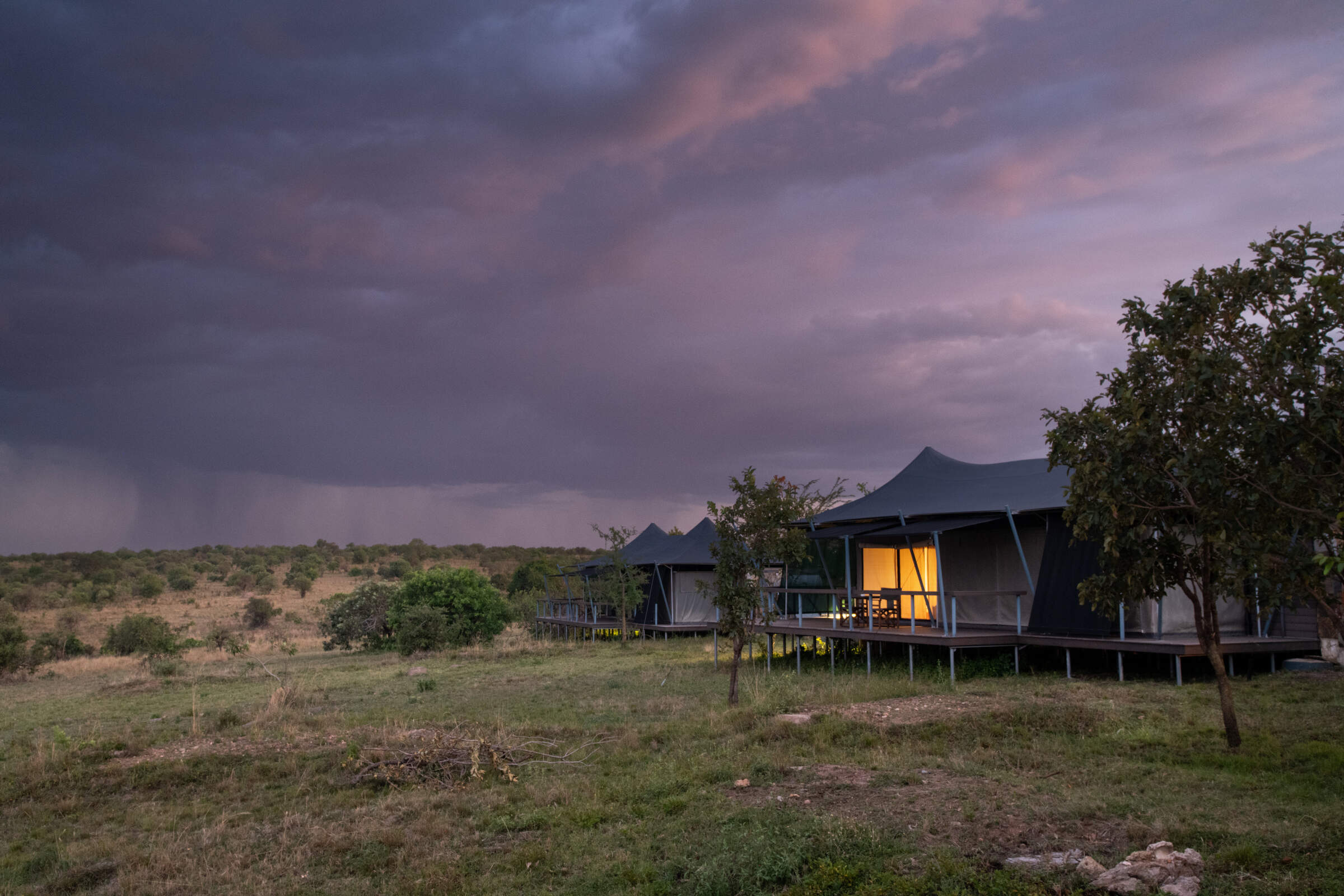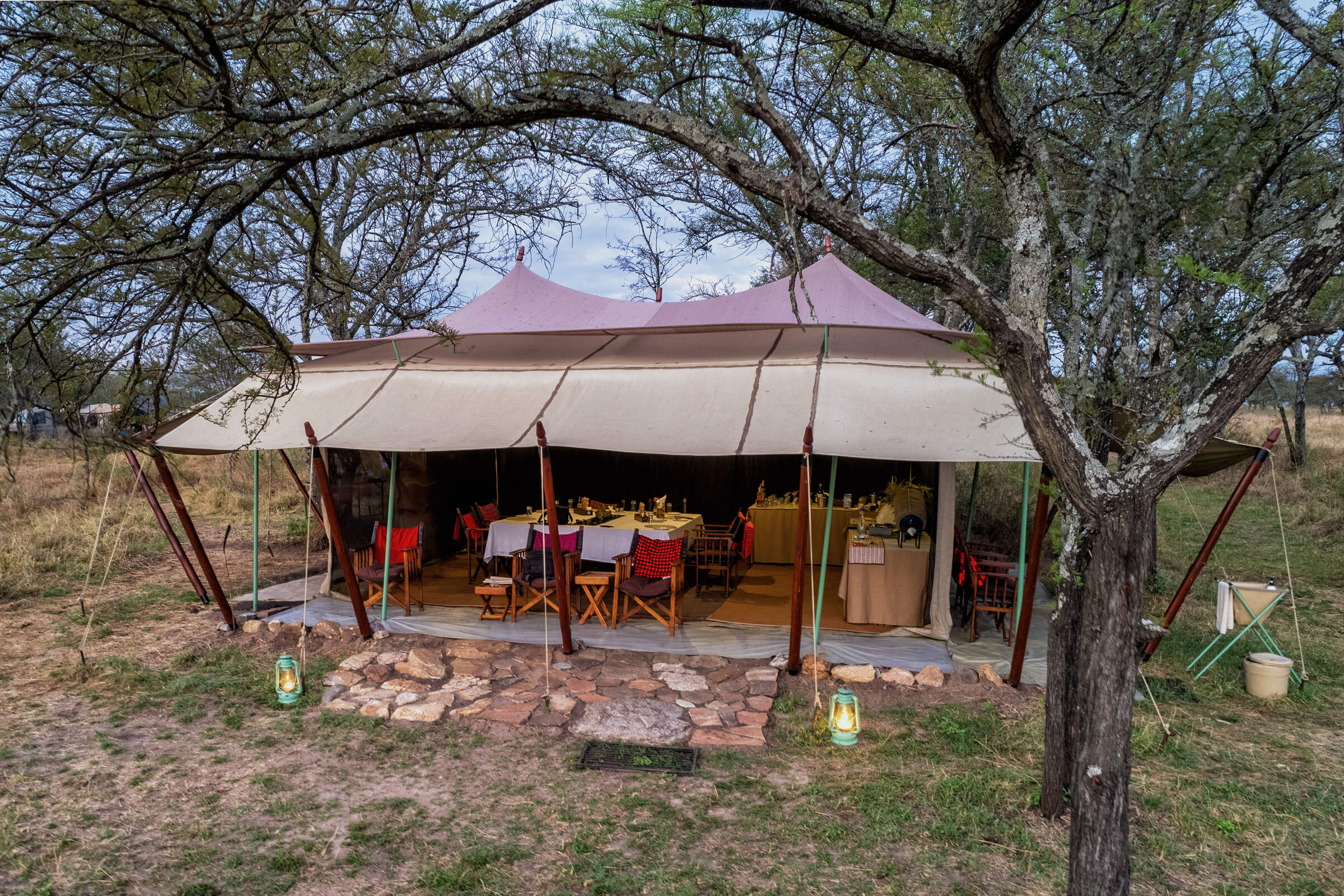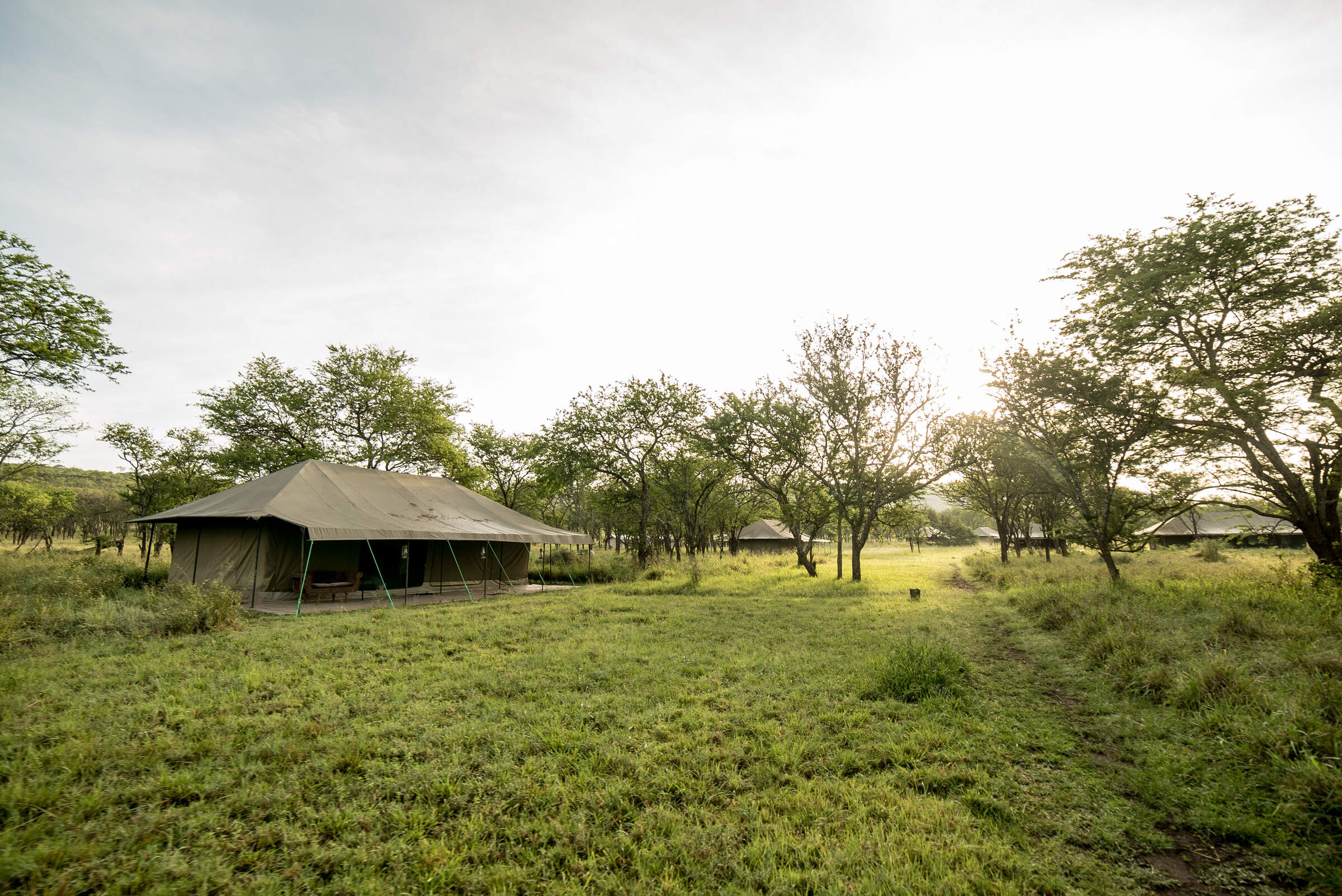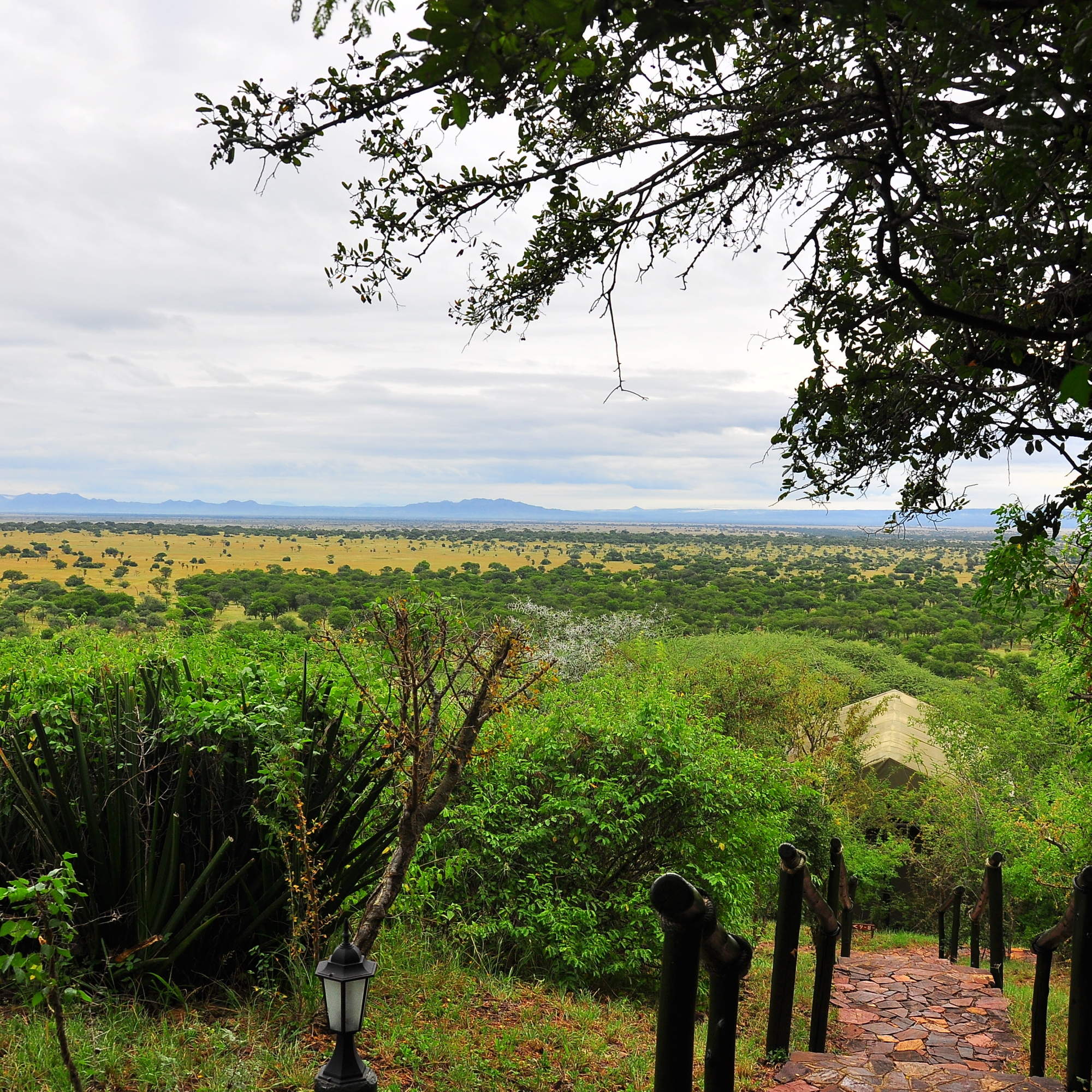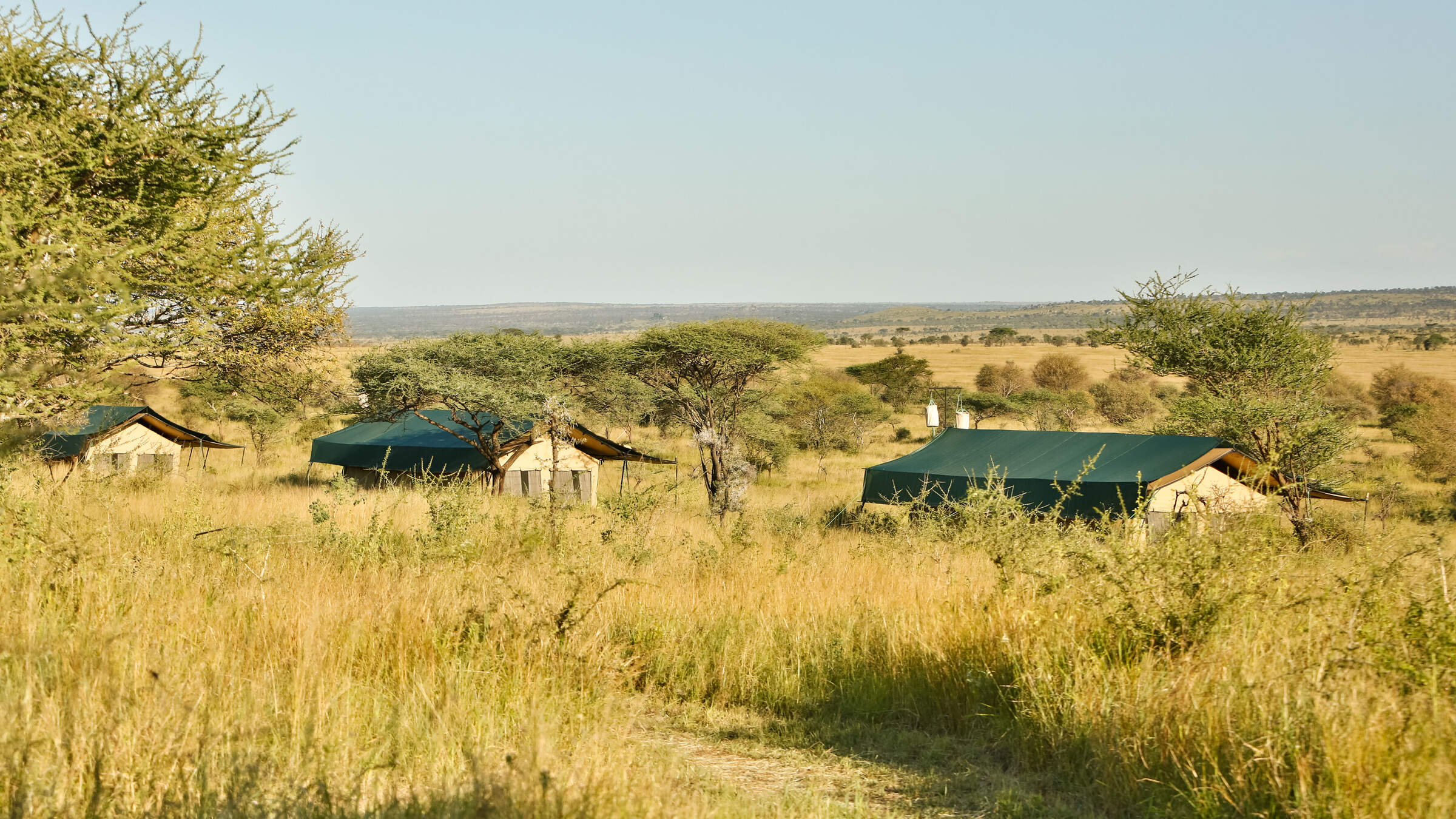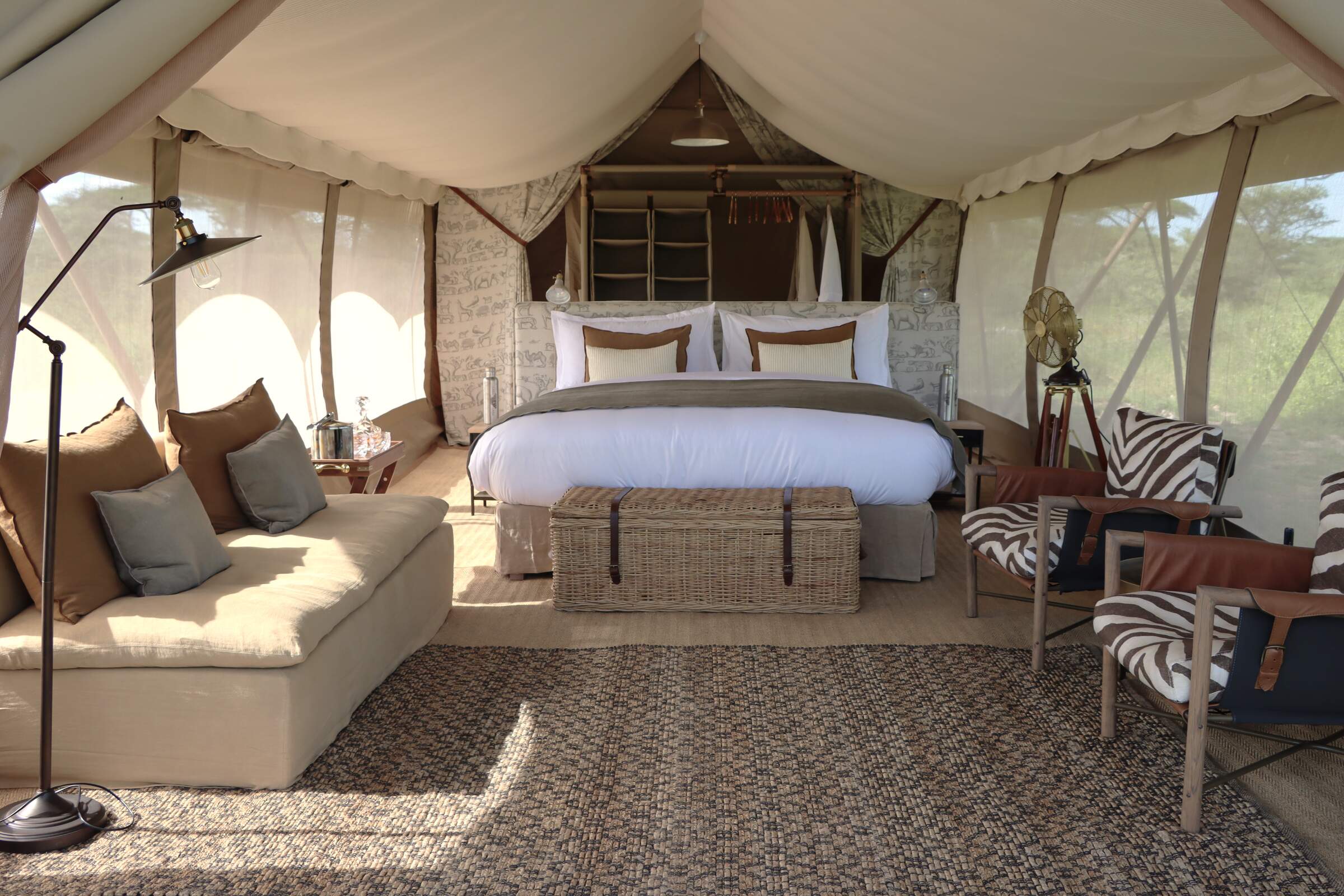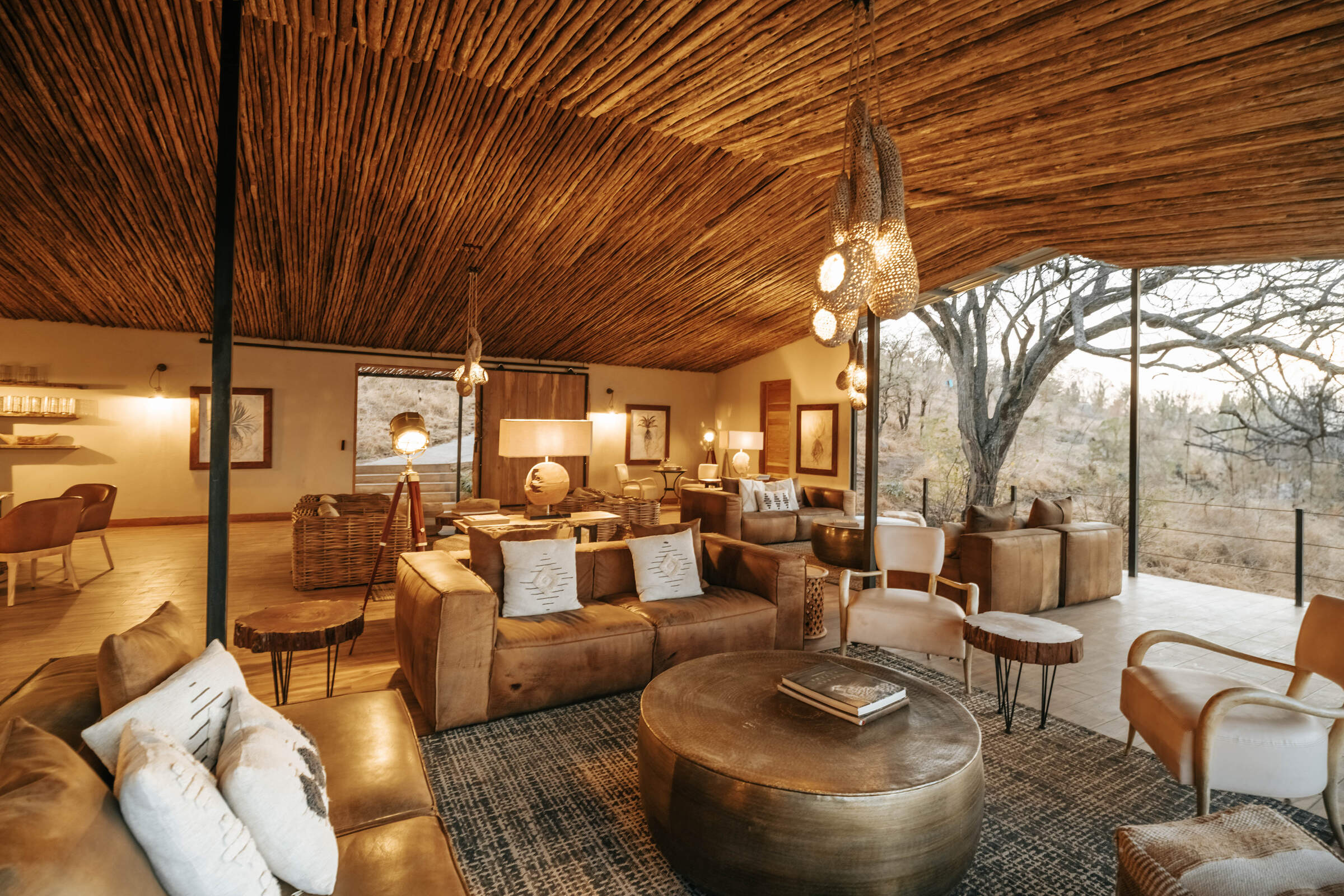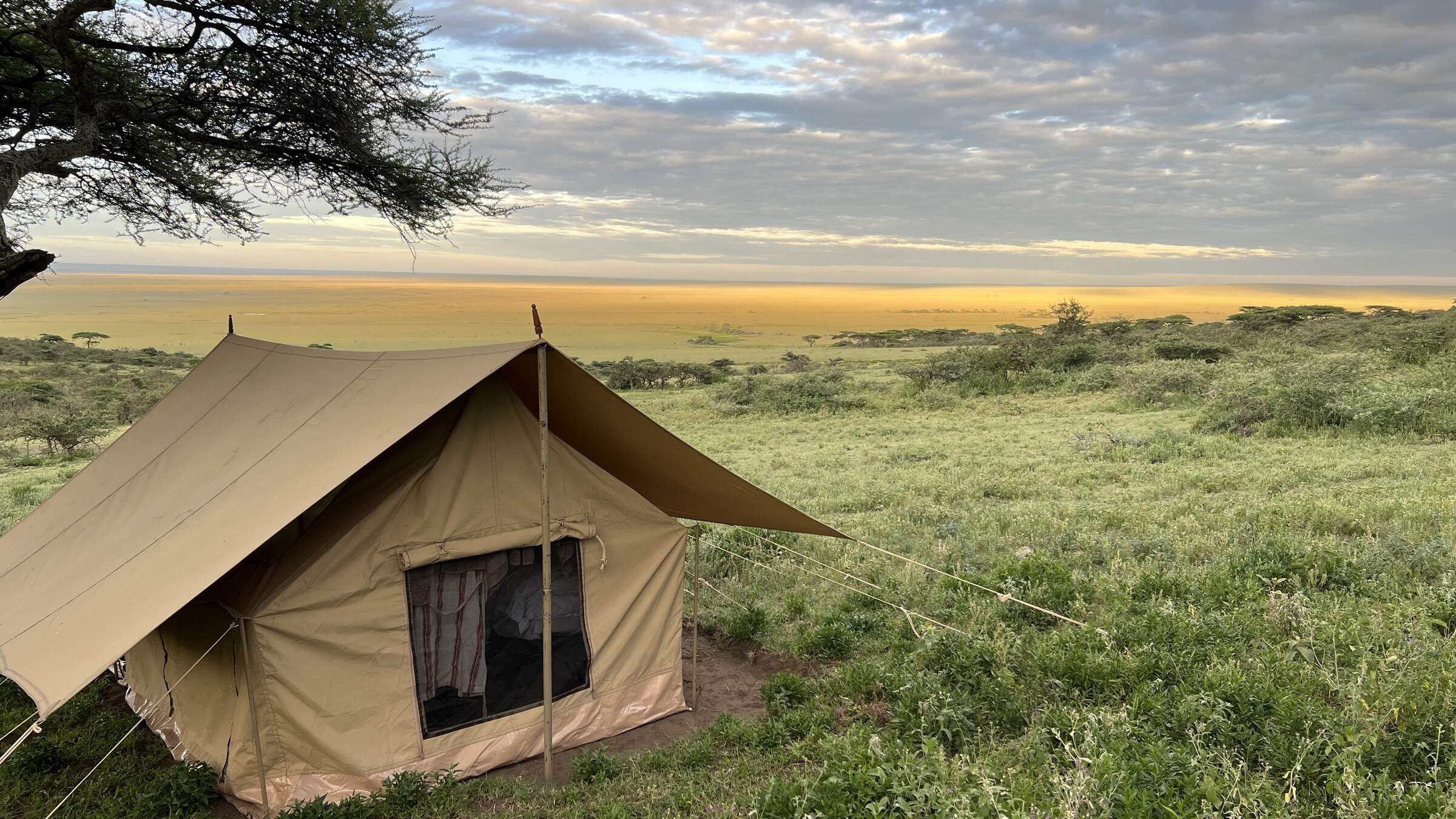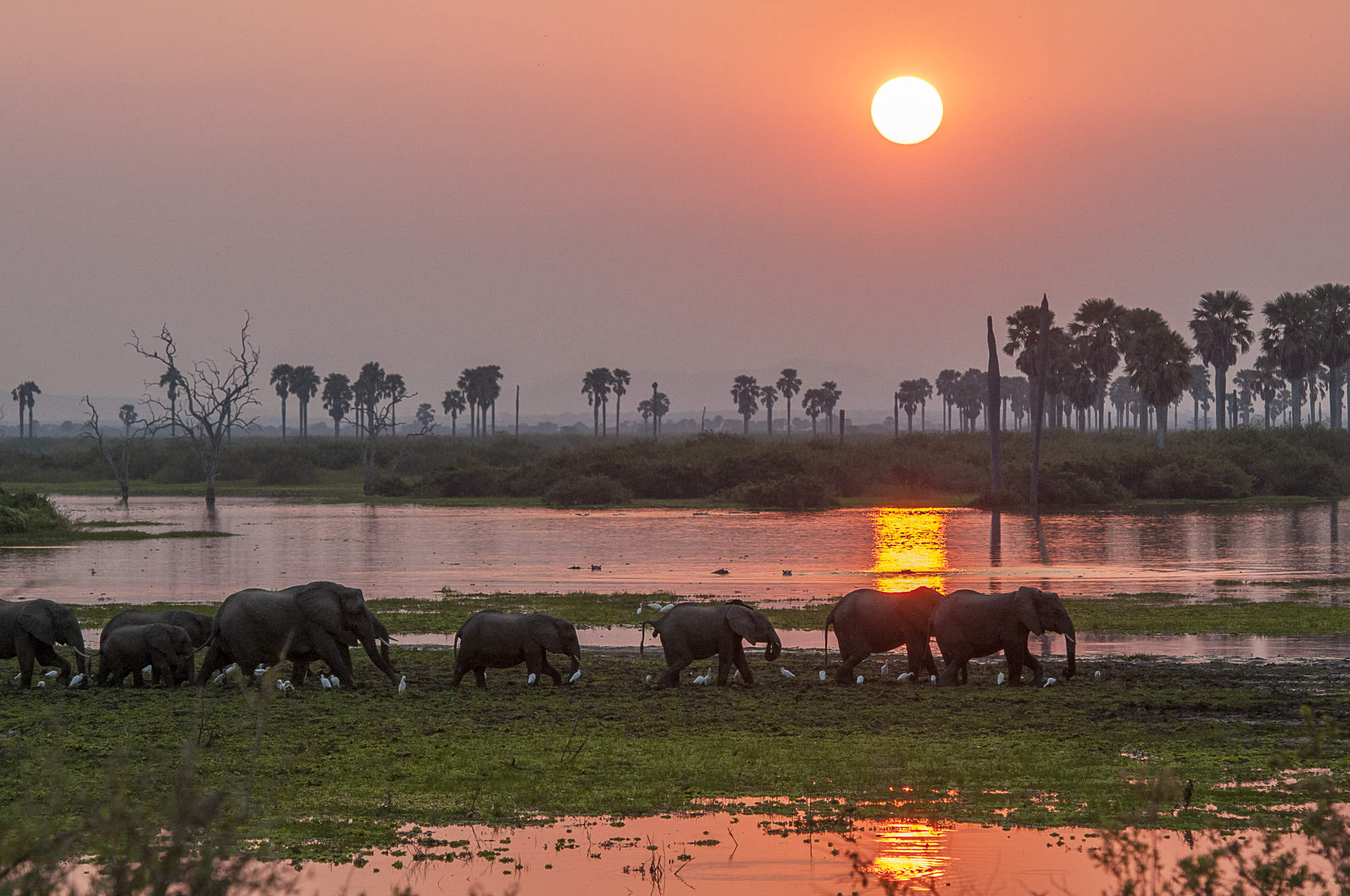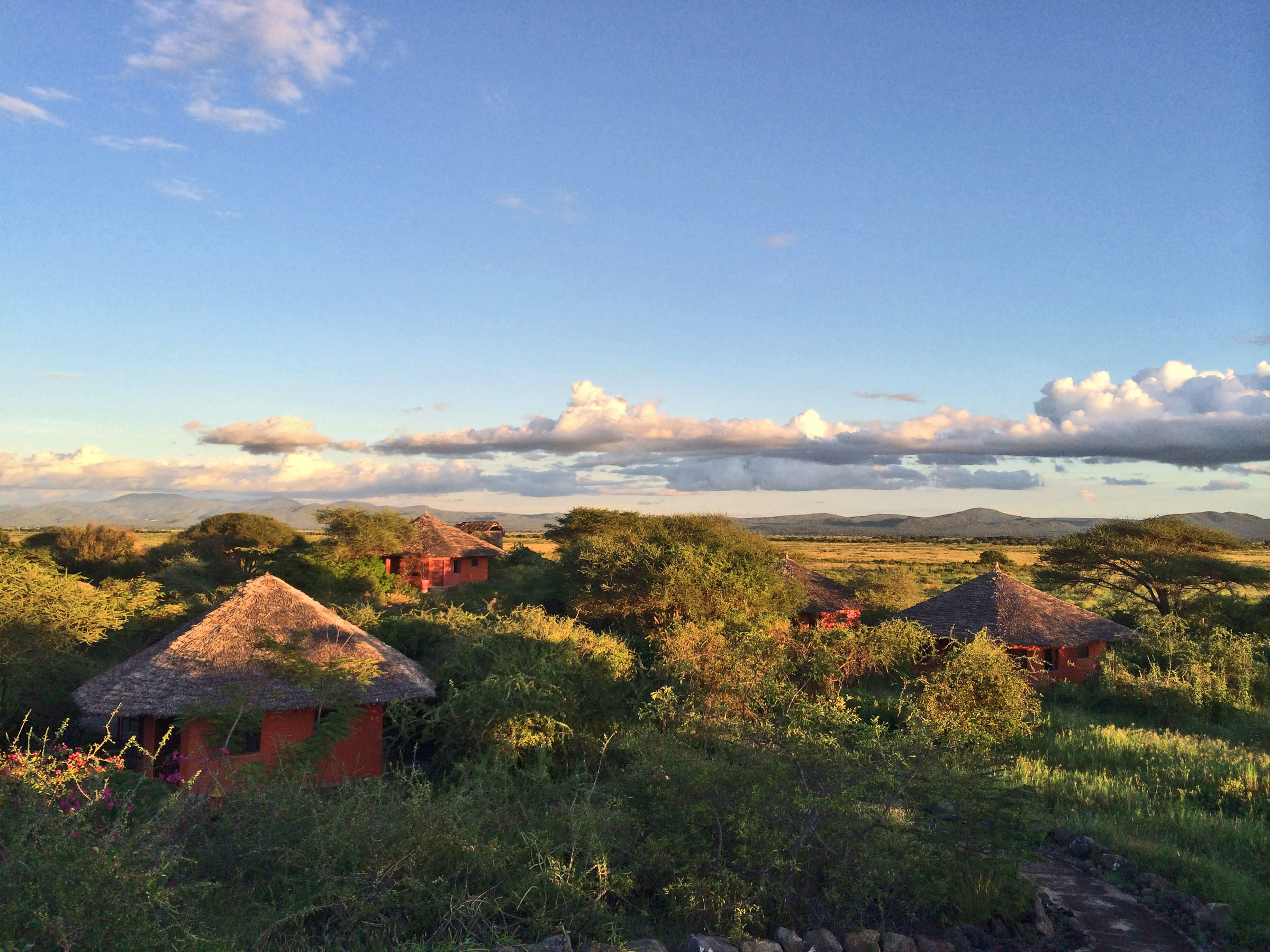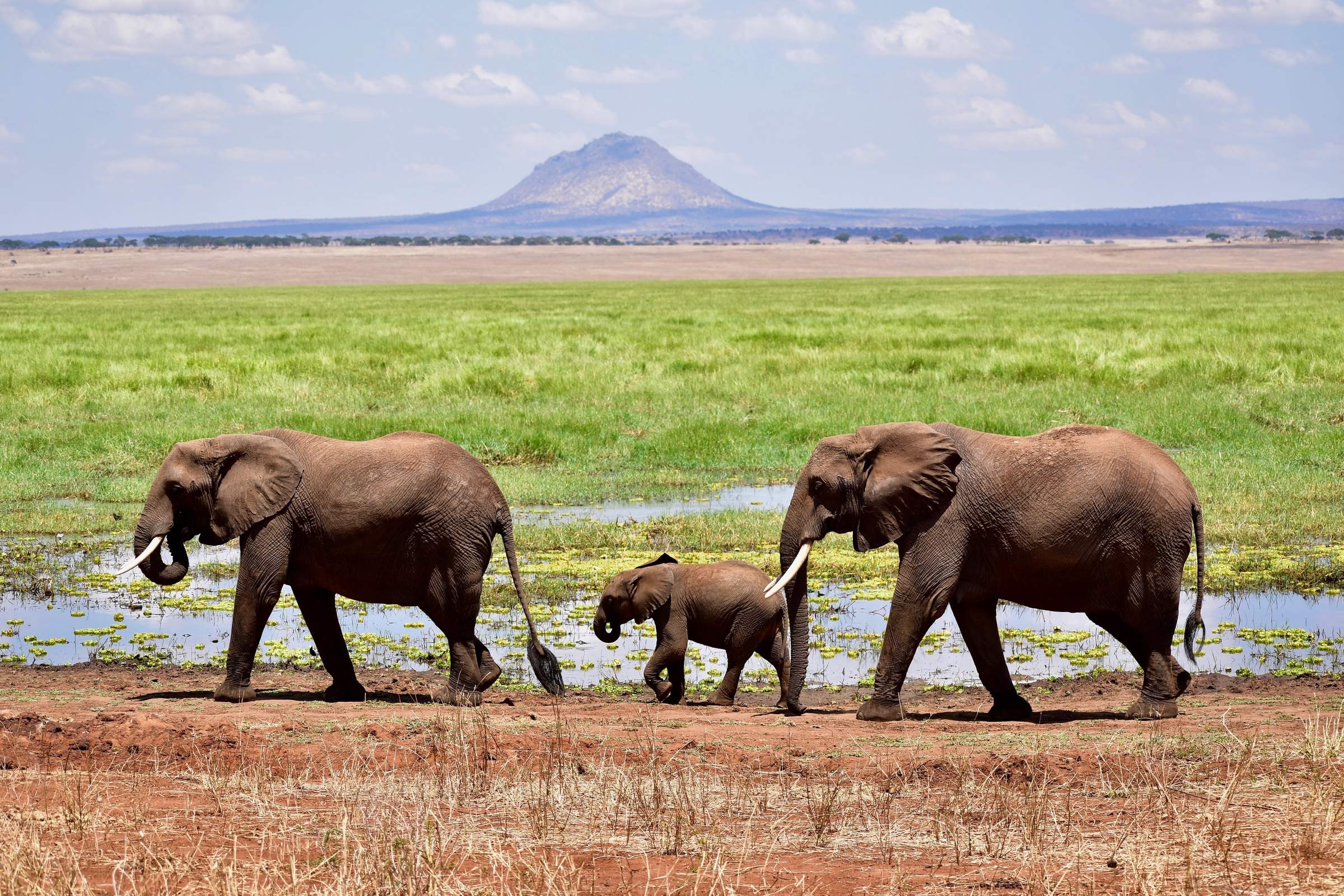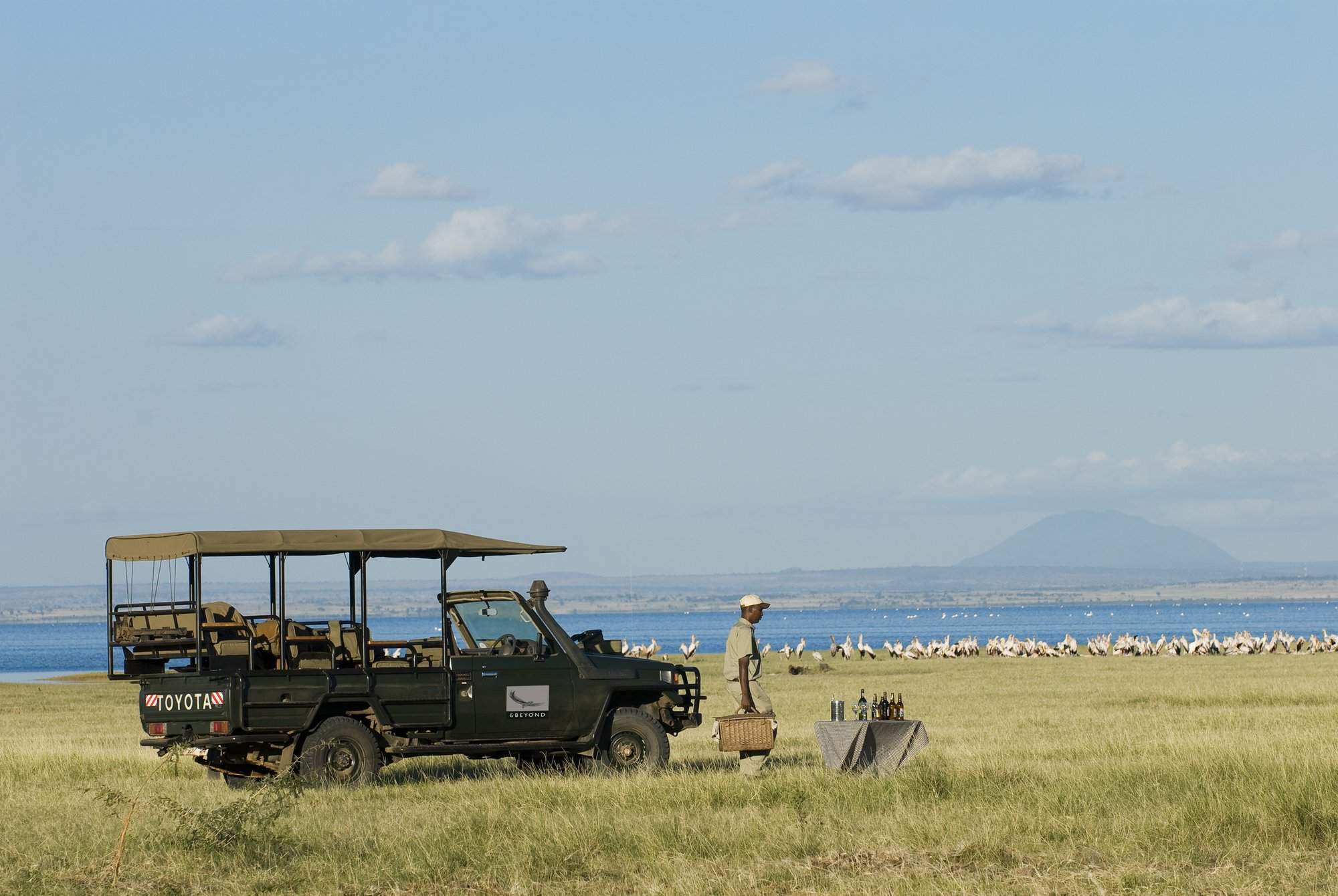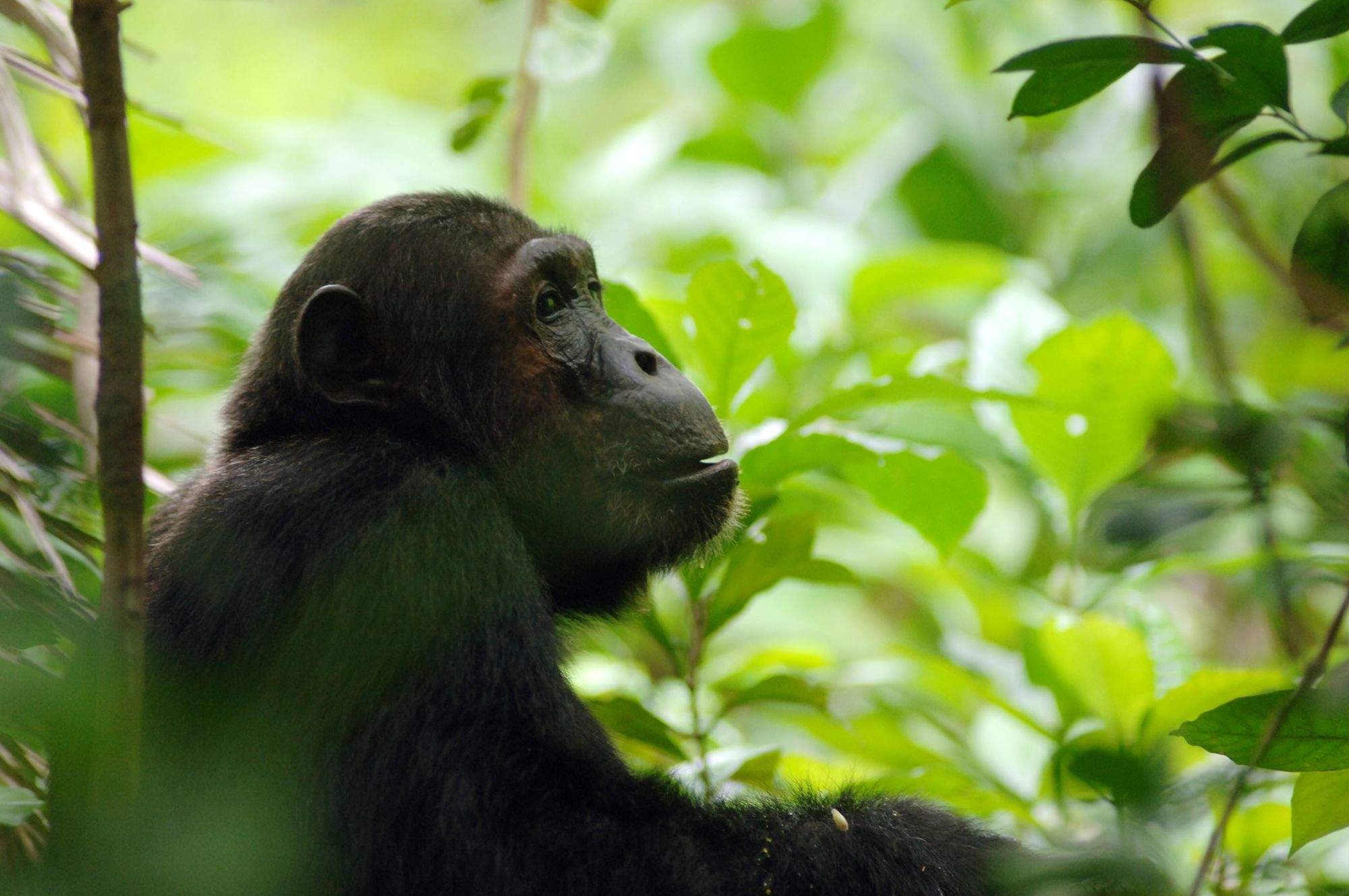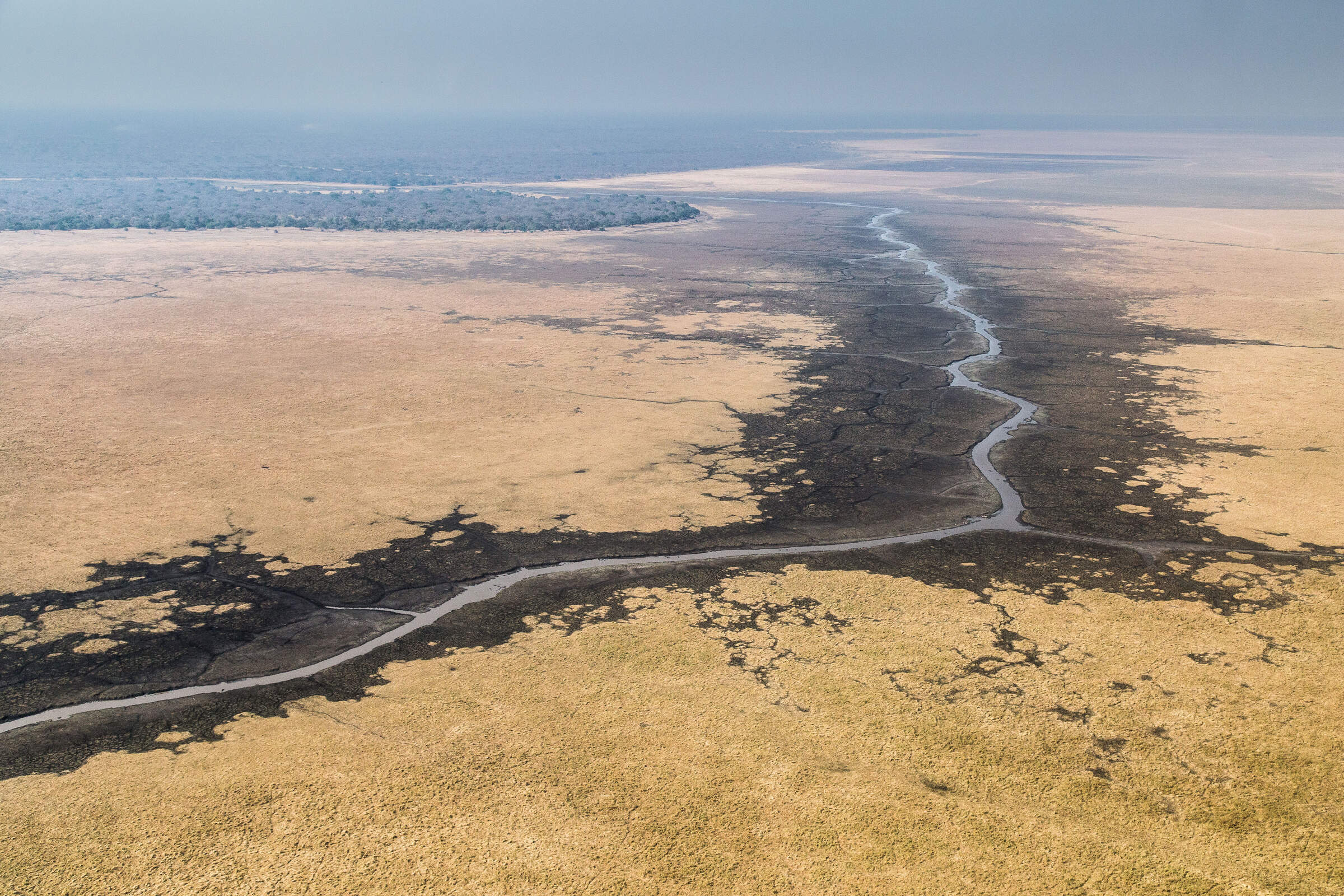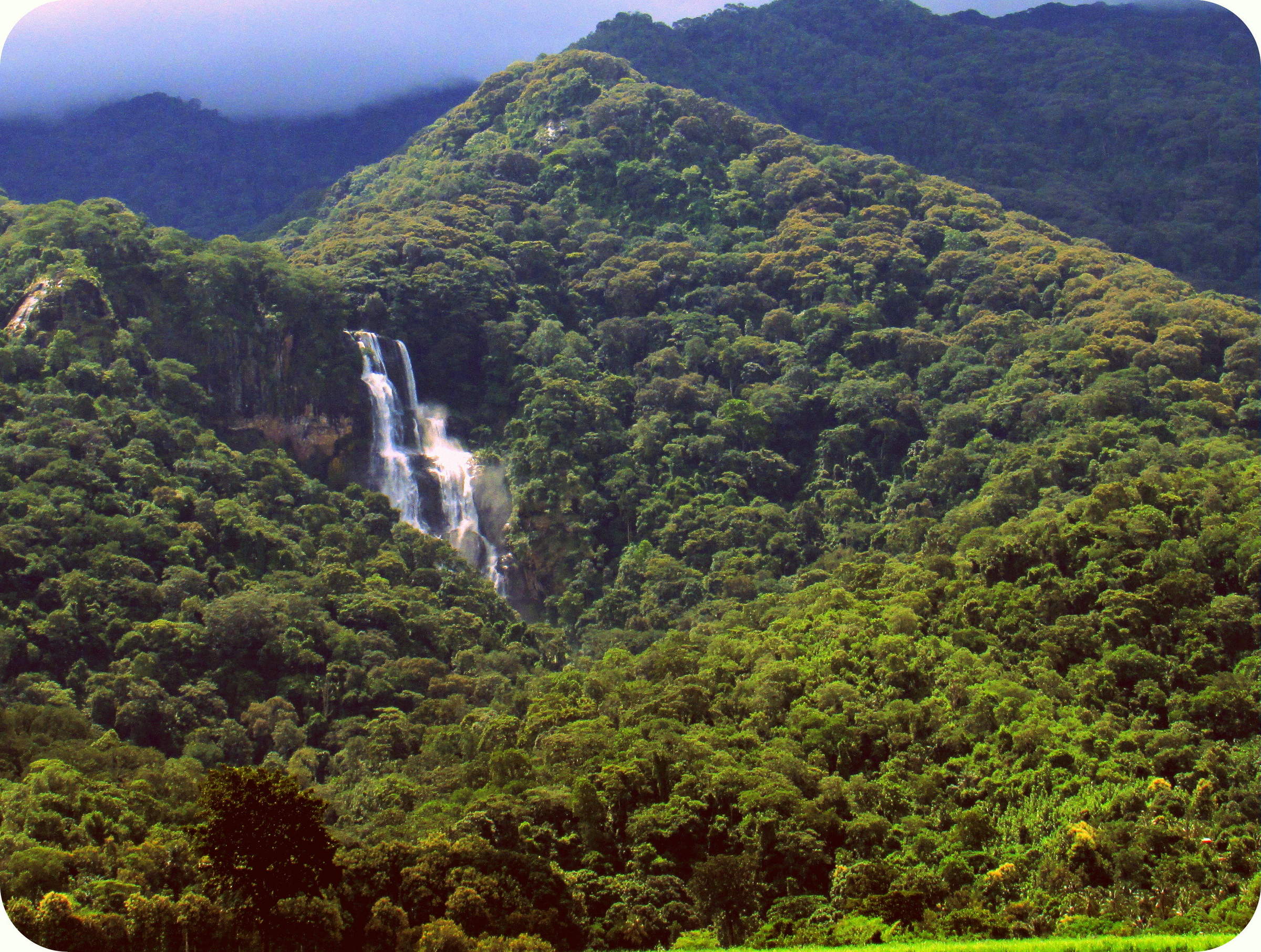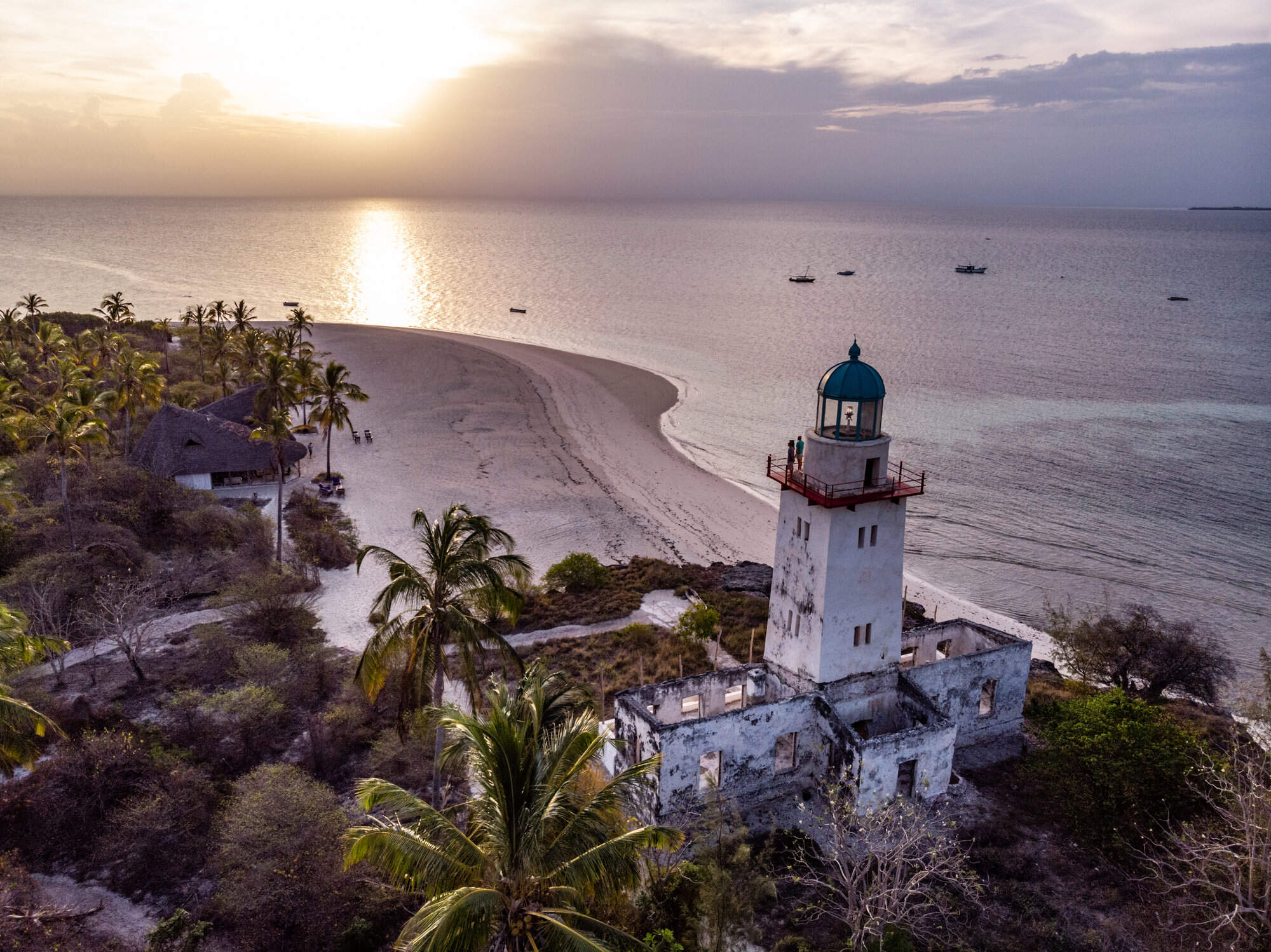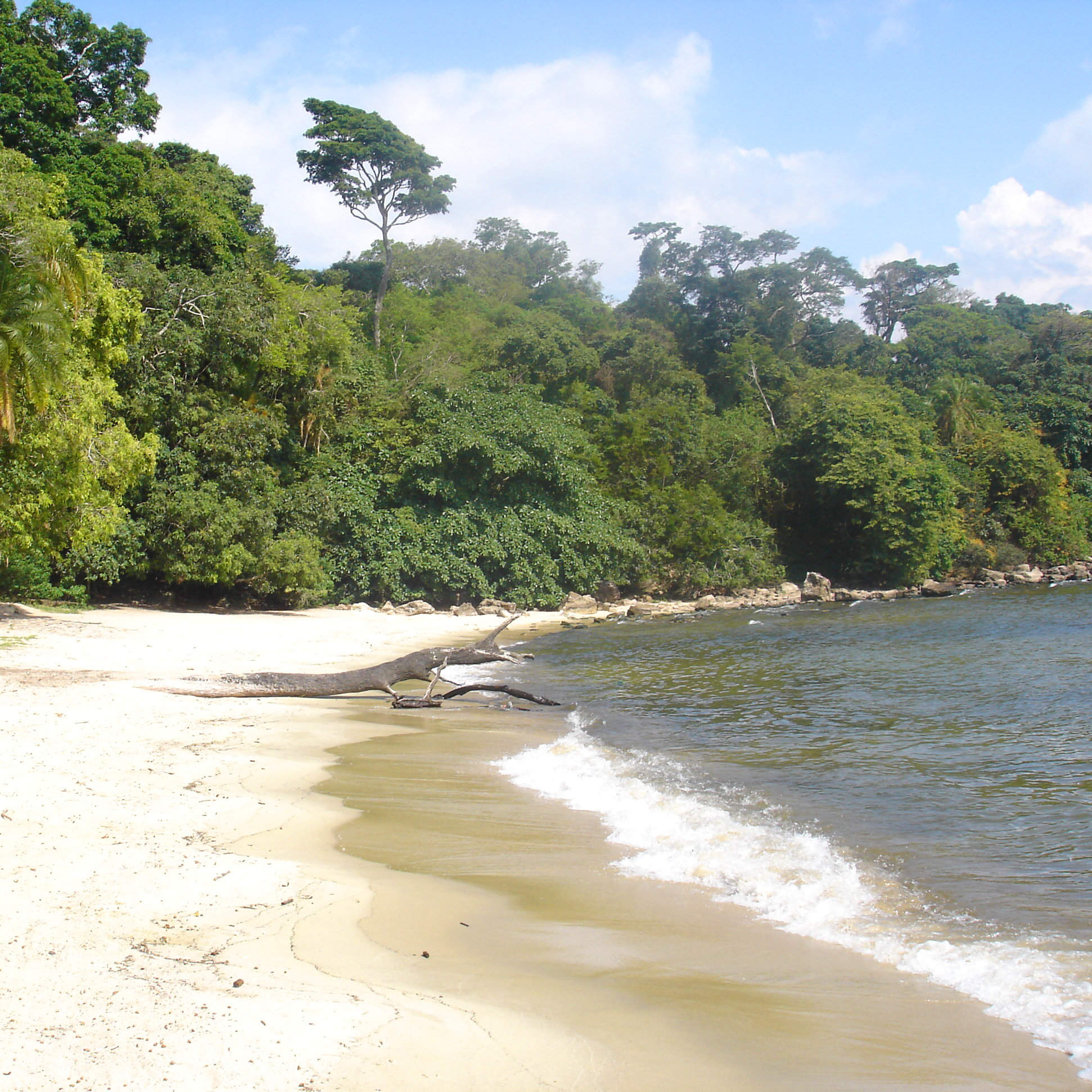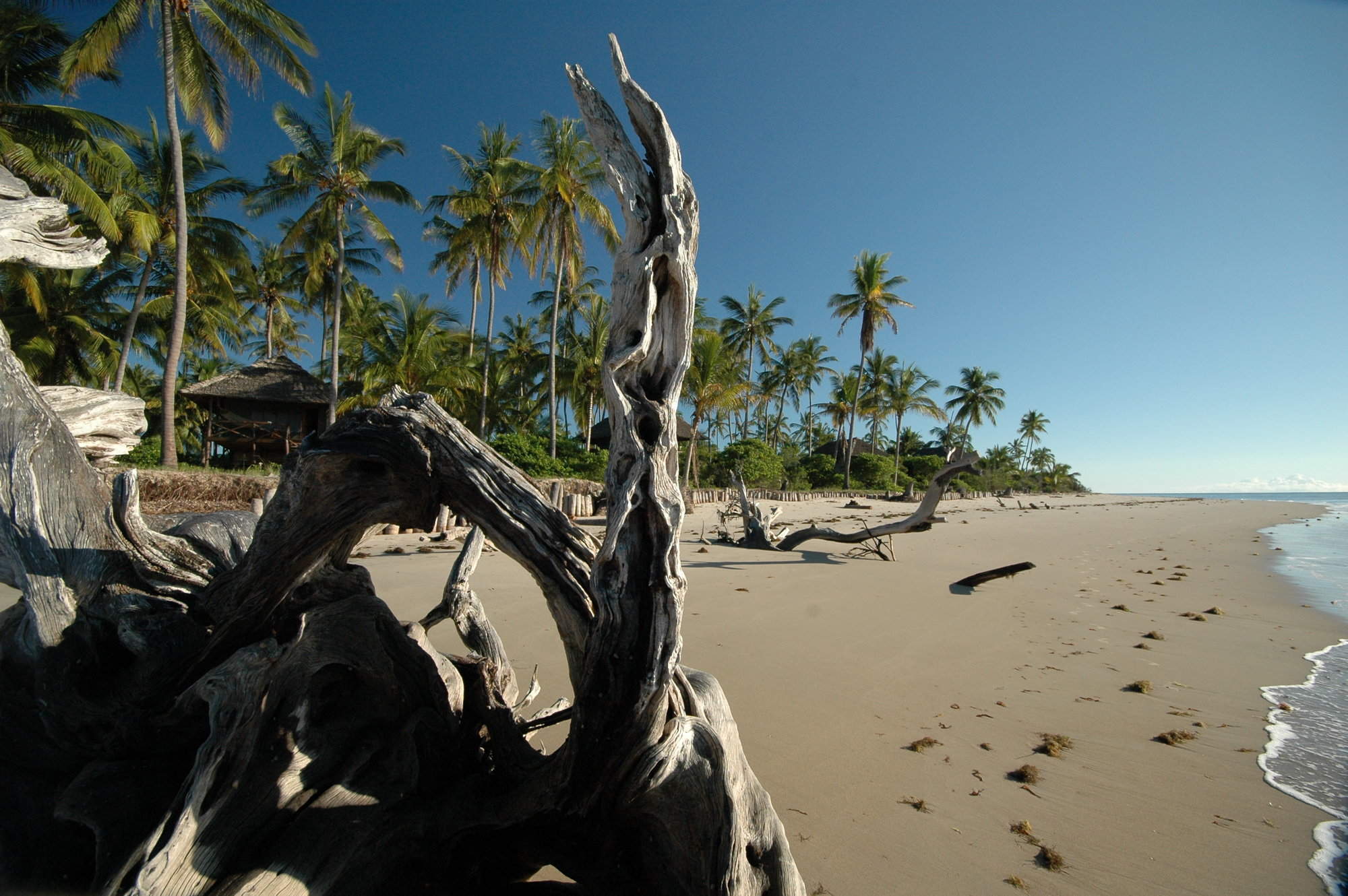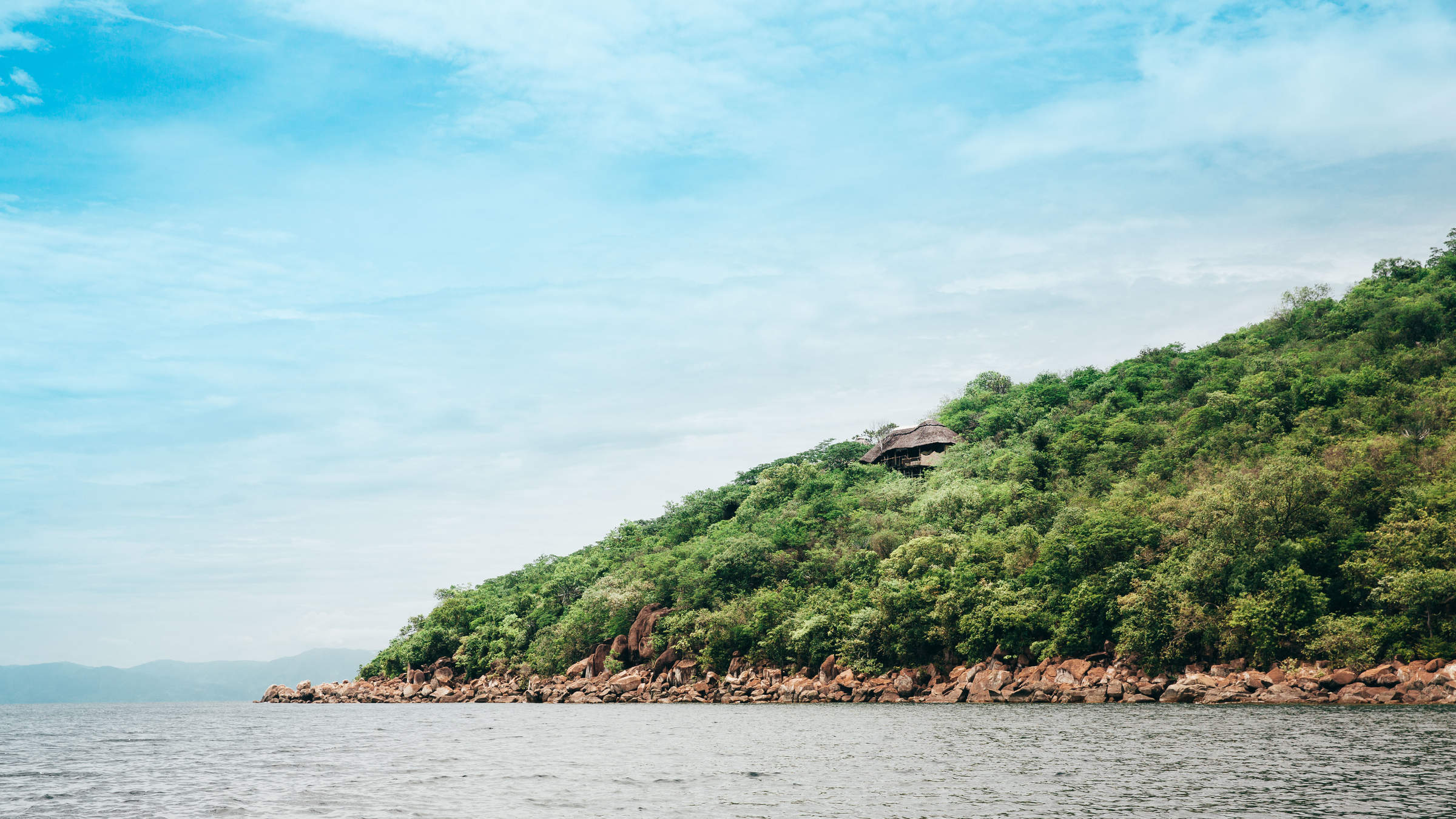Sayari Camp: Our full report
Sayari Camp is a luxurious, permanent camp situated in the far north of Tanzania’s Serengeti National Park.
The Mara River meanders from east to west through this remote region's undulating bush, which is home to permanent, large populations of plains wildlife. This part of the Serengeti ecosystem is also a spectacular area to witness the great wildebeest migration.Sayari is remote from any populated areas, in a part of the Serengeti where the rocky hills and rolling plains make the scenery more interesting and undulating than the normal fairly flat topography. The Serengeti's only permanent river, the Mara, is wide and fast-flowing as it runs through this area and is home to many crocodiles and hippos.
Sayari Camp is split into two different wings, with six tents in the smaller (east) camp, to the north of the swimming pool, and nine in the bigger (west) camp on the south side. Each wing has its own lounge and dining area, with a central swimming pool linking the two, a set up that helps to lend each wing the feel of a small camp.
The 15 tents at Sayari are each set up on a similar plan, with the exception of the larger honeymoon tent, which has a secluded outdoor bath, a four-poster bed, a huge extended deck and an uninterrupted view.
The family tent has been set up to accommodate five people but can take up to six. There is one triple room and one double each with its own bathroom.
Most of the tents are relatively close together, but they are well oriented to retain privacy. Some, however, are a good way from the central area – about a 10-minute walk for tent 15 (though that one has the bonus of an outside bathtub). Guests with mobility issues are recommended to stay in tent 9. Because of the distance, and the fact that the area teems with wildlife, including hippos looking for good grazing, a vehicle is often used to transport guests to and from their tents.
Inside, the tents are very spacious, with sliding wooden doors, canvas and wood walls and pine wooden floors giving an unusual, slightly Swiss chalet feel. Comfortable double or twin beds are surrounded by mosquito nets. The bedding and cushions in red and khaki tones complement the overall modern aesthetic. Minimalist iron bedside tables flank the beds, and at their foot sit two red leather pouffes. You'll also find heavy, rustic wooden luggage storage stands, a large electric fan and contemporary lighting. There are complementary mini bars stocked with both soft and alcoholic drinks in each tent.
Behind a sliding panel, a cupboard with a hanging rail and shelves hides white towelling bathrobes, an electronic safe and a selection of insect sprays. Another sliding panel leads to the impressive en-suite bathroom, whose focal point is a large, free-standing, faux-marble bath. Sliding glass doors in front of the bath reveal beautiful views of the bush beyond the outdoor deck. The bathroom is also complete with his and her basins that stand on a wooden base with mirrors above and with a selection of complimentary toiletries. A rain shower and toilet are located in separate cubicles.
Perhaps the aspect we enjoy most about these rooms is outside: the vast teak decks, where you can stretch out on a pile of beanbags or sit on a director's chair to simply look out into the bush. Although you can't quite see the Mara River from camp, the best views towards the river are probably from tents 11, 13 and 15.
The main lounge area of the bigger camp is a large L-shaped canvas-walled structure raised on a wooden deck, with an extensive outdoor deck. Glass folding doors can be opened up completely or closed depending on the weather. The décor is stylish and contemporary, with soft furnishings in shades of brown and beige. There are unusual wooden artefacts and carvings as well as modern statement light fittings. Highly polished wooden floors unite the two wings of the 'L'. The left wing houses a comfortable seating area with sofas and a big rustic wooden table with a few nature books and magazines; the right wing features a smaller seating area along with a large wooden bar and bar stools. The camp also has its own micro-brewery, brewing its own IPA pilsener, as well as blonde and brown ales available on tap. This is a great spot for guests to meet up for a drink and chat before dinner.
Meals in this camp are served in a large, decked, dining tent with a spacious wooden terrace for catching the morning warmth at breakfast, or dining under the stars at night. Breakfast and lunch are taken at individual tables (although breakfast is often served as a bush breakfast in a selected spot above the river, at the conclusion of the morning game drive). Dinner in camp is usually communal, hosted by the managers, and enabling guests to chat over the day's sightings and events.
The smaller camp at Sayari has its own small lounge/dining room, similar in style to that in the left wing of the larger camp.
Separating the two camps is a swimming pool, impressively built into the rocks and with lovely views from funky beanbags and sturdy sunloungers shaded by umbrellas. A small curio shop carries a good range of Maasai jewellery made by a cooperative in Arusha, and a selection of authentic hand-crafted items from other parts of Tanzania. There is also an interesting 'map room', with a selection of books, games and maps. Private dinners can also be held here.
Leading from the swimming pool is a spa which has a large treatment room with views of the Serengeti.
New in 2023 is the addition of the Sayari villas. A short golf buggy ride away from the main camp are two two-bedroomed villas, which can be occupied either independently or ideal for a small group of friends or family travelling together. Each villa has a main lounge with polished pine floors and sliding glass doors leading onto a terrace. Two en-suite bedrooms lead off each side of the lounge.
The villas operate independently from the main camp and each has a small kitchen with its own chef and butler, as well as its own safari guide and vehicle.
A central area is located between the two villas with a dining area and another kitchen, ideal if a larger party is occupying both villas. Here is also a small round pool in a wooden deck
The Mara River and the variety of vegetation around it attract a good population of resident wildlife, and Sayari Camp makes a wonderful base from which to watch both this and – between about July and October – the the Great Wildebeest Migration.
On one stay at Sayari Camp we have watched as thousands of southbound wildebeest massed on the north bank close to the camp, but hesitated to take the plunge. They reported eventually seeing a crossing at another point, further downstream, where hundreds had drowned a few months earlier during a flash flood on their way north, and a few bones still lay scattered on the bank. They cheered as a single wildebeest swam south to join the rest of the herd – commenting that this was not the most exciting migration crossing, but every sighting, great and small, is a pleasure in this beautiful part of the Serengeti.
On another team member's visit one January – which is very much the off-peak season for Sayari – they found delightfully few other people around, yet still saw plenty of wildlife. This is a magical time to visit and arguably one of the Serengeti's best-kept secrets, for the feeling of exclusivity and the excellent rates.
Activities at Sayari centre on 4WD game drives. These focus on either the resident game or, when the migration is passing through, on predator interactions with the herds and the river crossings. A few travellers drive into Sayari, and will do their game drives with their own private guide and vehicle. However, if you fly here, your drives will be conducted in one of the camp's vehicles with a maximum of seven guests in each.
Unusually for a camp within the Serengeti National Park, it's also possible to do bush walks here. These will be led by a guide from the camp who is qualified to conduct walking safaris, accompanied by an armed ranger from the Tanzania National Parks Authority (TANAPA). These are run for up to six guests and generally last for 2–3 hours.
A balloon flight is another option at Sayari, at an extra cost. After a 5.00am pick up you'll be driven to the launch site for take-off at around 6.30am, landing for a champagne breakfast.
Our view
Our consistent experience is that Sayari is a well-run camp, with high levels of very personal service and great food. While the sheer luxury of the camp will not appeal to lovers of the wilderness, its biggest attraction is its location: perfect for witnessing the migration, at the right time of year. That said, we have noticed that this northern stretch of the Serengeti is no longer as quiet as it used to be, although out of season it is still very quiet up here.
Geographics
- Location
- Serengeti Migration Area, Tanzania
- Ideal length of stay
- Three nights here is typical, although during the wildebeest migration, four would be fine. Sayari is often combined with its more rustic sister camps, Olakira, Ubuntu and Kimondo. It also combines very well with its sister camp in the central Serengeti, Dunia.
- Directions
- Sayari Camp is 9km (a 15–20 minute drive) from Kogatende Airstrip.
- Accessible by
- Fly-and-Transfer
Food & drink
- Usual board basis
- Full Board & Activities
- Food quality
- On a recent visit, although we did not stay at Sayari we were fortunate enough to have lunch. There is a vegetarian option at every meal, and the chefs are incredibly accommodating with requests based on available ingredients.
As some guests are following their own timetable, with their own driver/guide, there is a particularly relaxed feel at breakfast and lunch.
Breakfast can be eaten before or after a morning game drive, depending on your schedule. You can choose from a cold buffet – fresh fruit, cereals, yoghurts, fresh muffins and freshly baked bread – followed by a hot breakfast of eggs cooked to order, sausages, bacon and toast, along with a selection of fruit juices and tea and coffee.
For lunch on our visit we had pork schnitzel, served with carrot and ginger salad, a green salad and grilled butternut. This was followed by fresh fruit salad for dessert.
Quite often guests will choose to take a boxed lunch out with them on safari so they do not have to return to camp. We are told that if guests are busy watching a river crossing close by, lunch can even be brought out to them!
A three-course dinner, usually taken at a long communal table, may be preceded by drinks around the fire. - Dining style
- Individual Tables
- Dining locations
- Indoor and Outdoor Dining
- Further dining info, including room service
- Yes
- Drinks included
- Most drinks are included at Sayari, except for champagne and premium wines.
The camp's reverse osmosis plant purifies the water before it is bottled for guests to drink.
Special interests
- Honeymoons
- For excellent game viewing, attentive service and a luxurious safari, Sayari Camp, in the far north of the Serengeti, is a lovely choice for a honeymoon to Tanzania. You can expect delicious food, year-round good game, and a romantic setting for your special celebration.
- See ideas for Honeymoons in Tanzania
- Luxury
- Sayari Camp is renowned for offering a remarkable wildlife experience in the Northern Serengeti, whilst also spoiling its guests. Their incredible attention to detail, combined with natural interiors aim to help you to make an authentic and meaningful connection with nature.
- See ideas for Luxury in Tanzania
Children
- Attitude towards children
- Children five years and older are welcome at Sayari.
- Property’s age restrictions
- Minimum age five years
- Special activities & services
- They don't offer any special services but do have some board games and the pool is a good size for a safari camp.
- Equipment
- Sayari doesn't have any cots or highchairs.
- Generally recommended for children
- Sayari would be a lovely camp for mature children from 12 years old, and the pool is a real bonus during the hot months.
- Notes
- Parents need to be aware of Sayari's remote location and the high risk of dangerous wild animals, which often wander through camp. It is also a peaceful camp, so children need to be old enough to respect this.
Our travellers’ wildlife sightings from Sayari Camp
Since mid-2018, many of our travellers who stayed at Sayari Camp have kindly recorded their wildlife sightings and shared them with us. The results are below. Click an animal to see more, and here to see more on our methodology.

100% success

100% success

100% success

100% success

89% success

89% success

89% success

78% success

71% success

67% success

50% success

43% success

38% success

33% success

29% success

25% success

0% success

0% success
Communications
- Power supply notes
- There is a back-up generator so power is available in the rooms 24/7. It is possible to use a hairdryer in camp, but guests are asked to try and use this during the day to make use of the solar power.
- Communications
- There is cellphone reception at Sayari, and WiFi is available in the rooms but not the main areas. Fibre-optic broadband was installed in December 2016.
- TV & radio
- None
- Water supply
- Borehole
- Water supply notes
- Water from Sayari’s borehole is used for washing. All tents have flushing toilets and plumbed in showers. The camp's reverse osmosis plant purifies the water before it is bottled for guests to drink.
Health & safety
- Malarial protection recommended
- Yes
- Medical care
- Some of the staff are first-aid-trained and they have a first-aid box on site, as well as in the vehicles. The camp has connections with the Park Doctors who can advise and even prescribe via a video conference call. The nearest hospital is in Arusha which is an hour and a half by air. Sayari has links to the flying doctors service for emergencies.
- Dangerous animals
- High Risk
- Security measures
- There are 'askaris' (local watchmen) on duty during the night. They will escort you to and from your tent after dark. There are even gold buggies to shuttle guests to the tents furthest from the main area.
- Fire safety
- There is a fire break around Sayari and there are fire extinguishers in the rooms and the main areas. Staff are trained to use the fire extinguishers.
Activities
4WD Safari
Birdwatching
Cultural excursion
Fly-camping
Hot air ballooning
Private activities
Extras
- Disabled access
- On Request
- Laundry facilities
- Laundry is included at Sayari. It is handwashed by local staff so, for cultural reasons, underwear (ladies or gents) is not accepted. Soap is provided in the bathrooms for this.
- Money
- There are electronic safes in each room. There is no facility for currency exchange.
- Accepted payment on location
- Sayari accepts US dollars, GB pounds, euros and Tanzanian shillings, as well as Visa and Mastercard with no surcharge. Cashback is not possible.
Other lodges in Serengeti Migration Area
Alternative places to stay in this same area.

